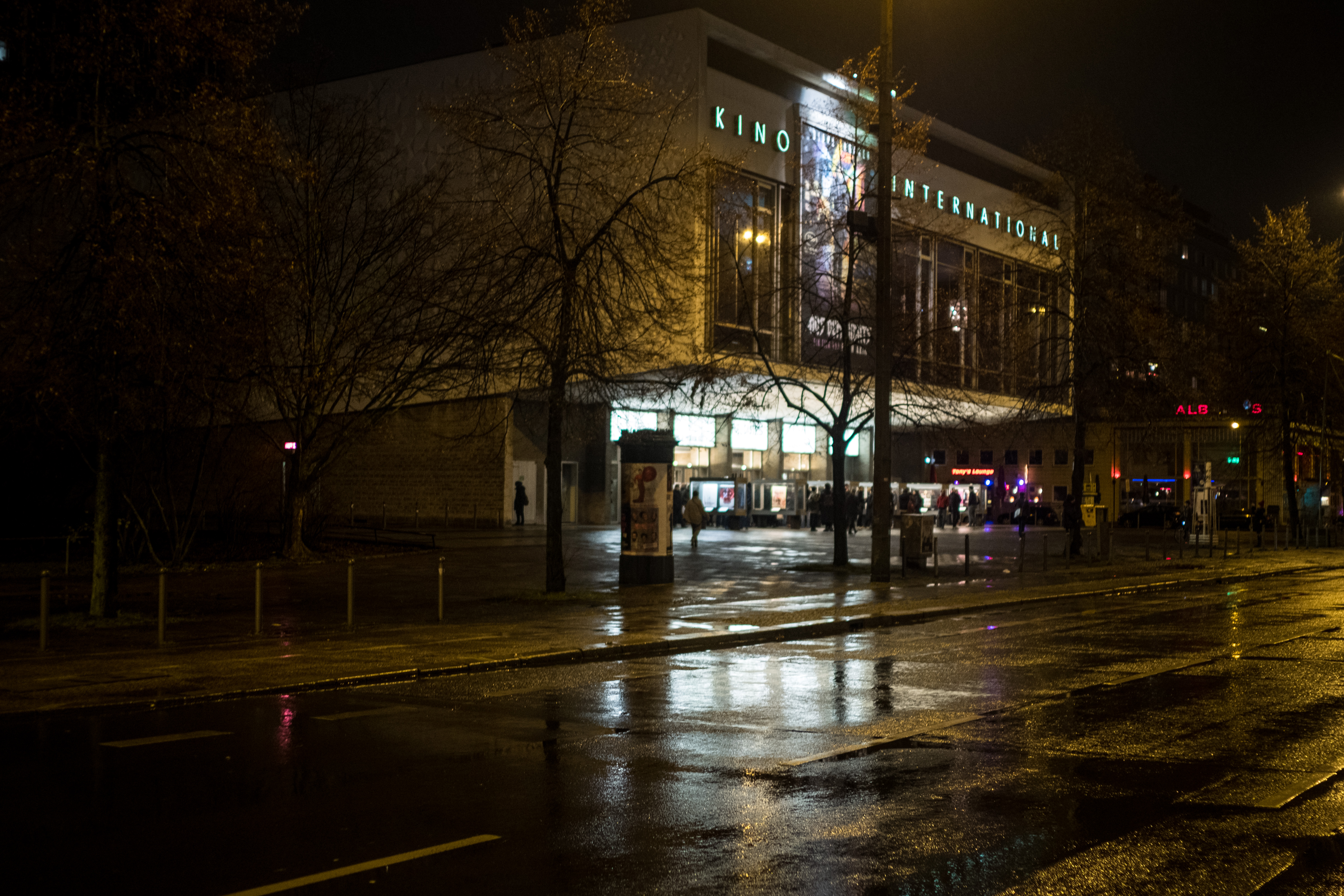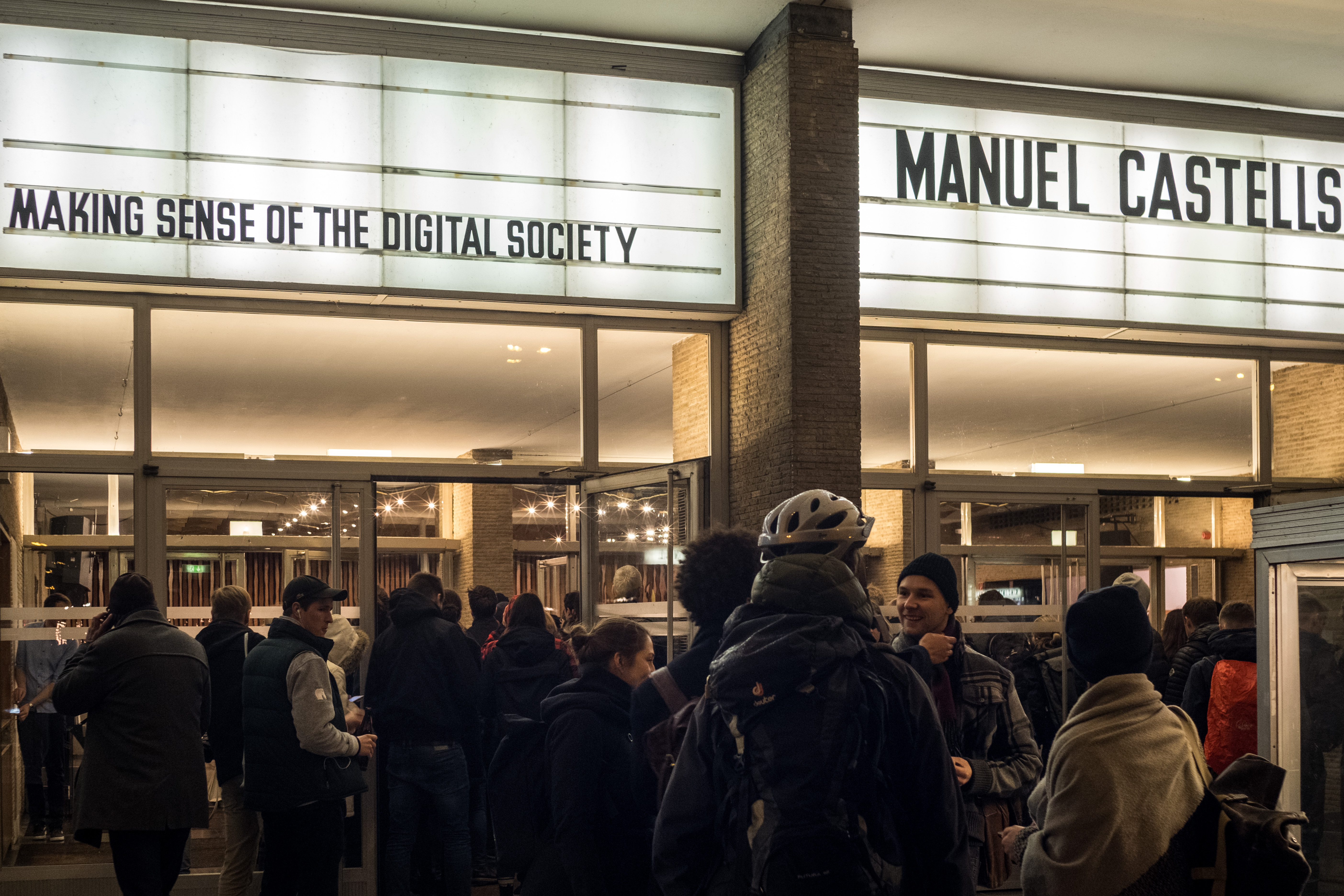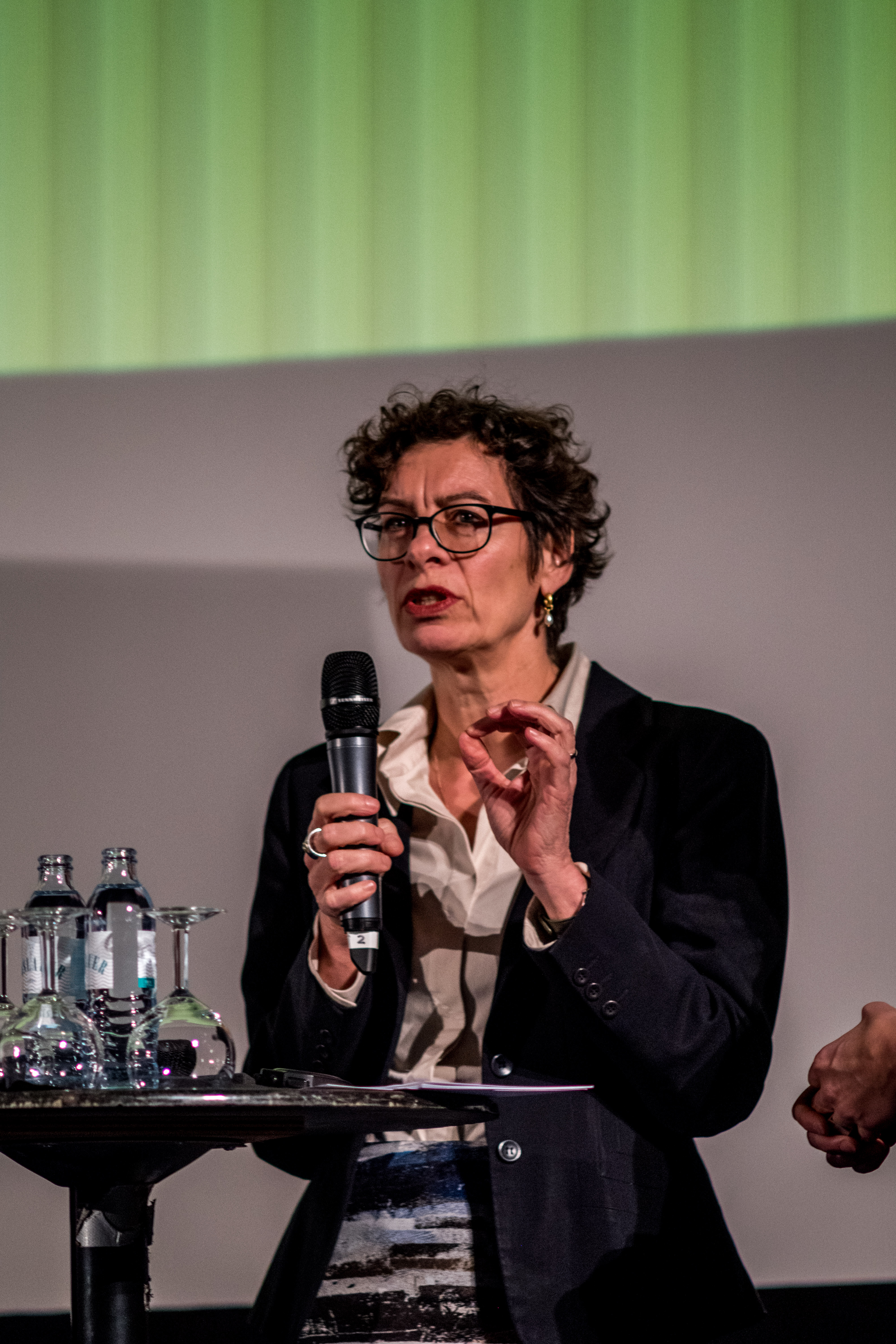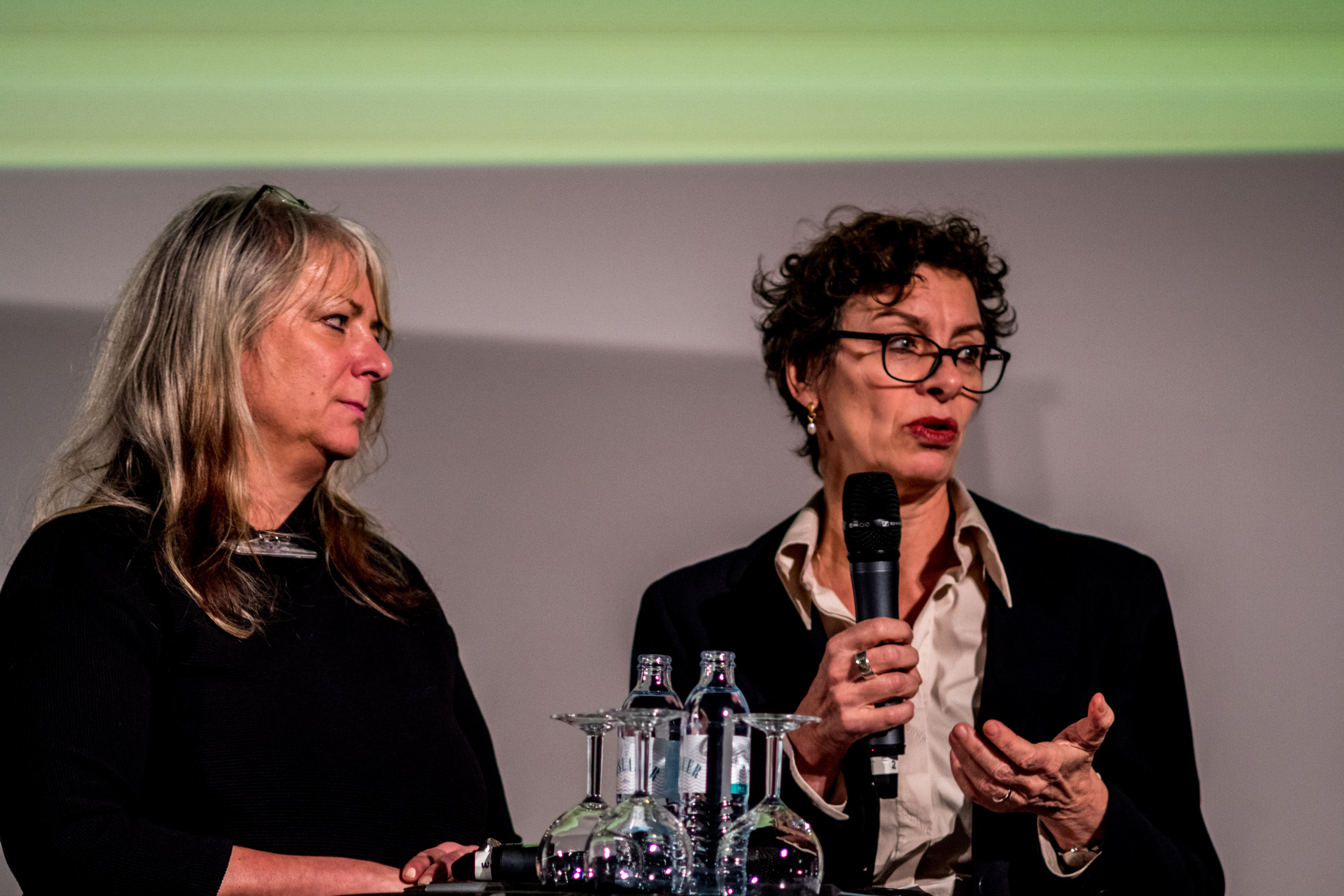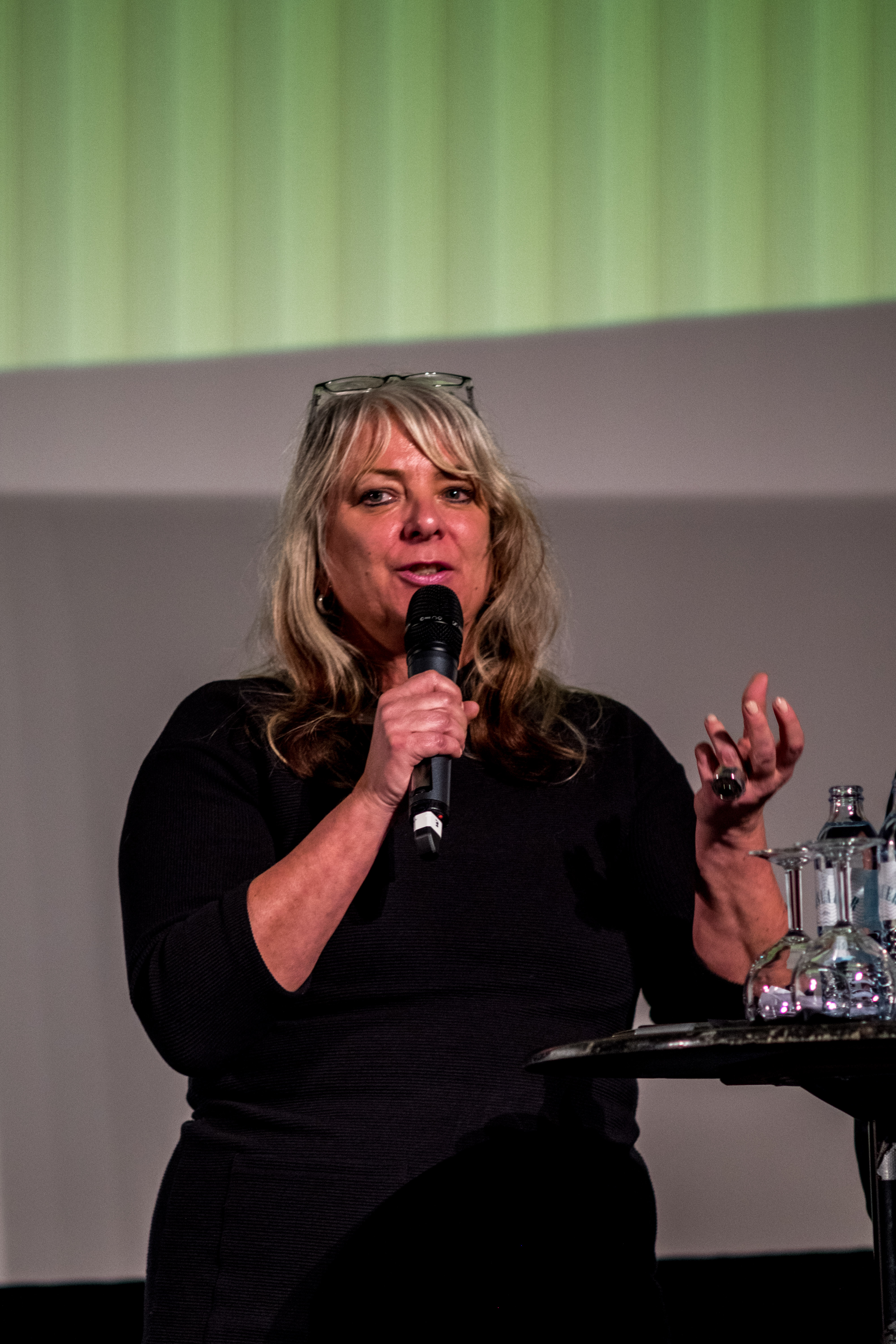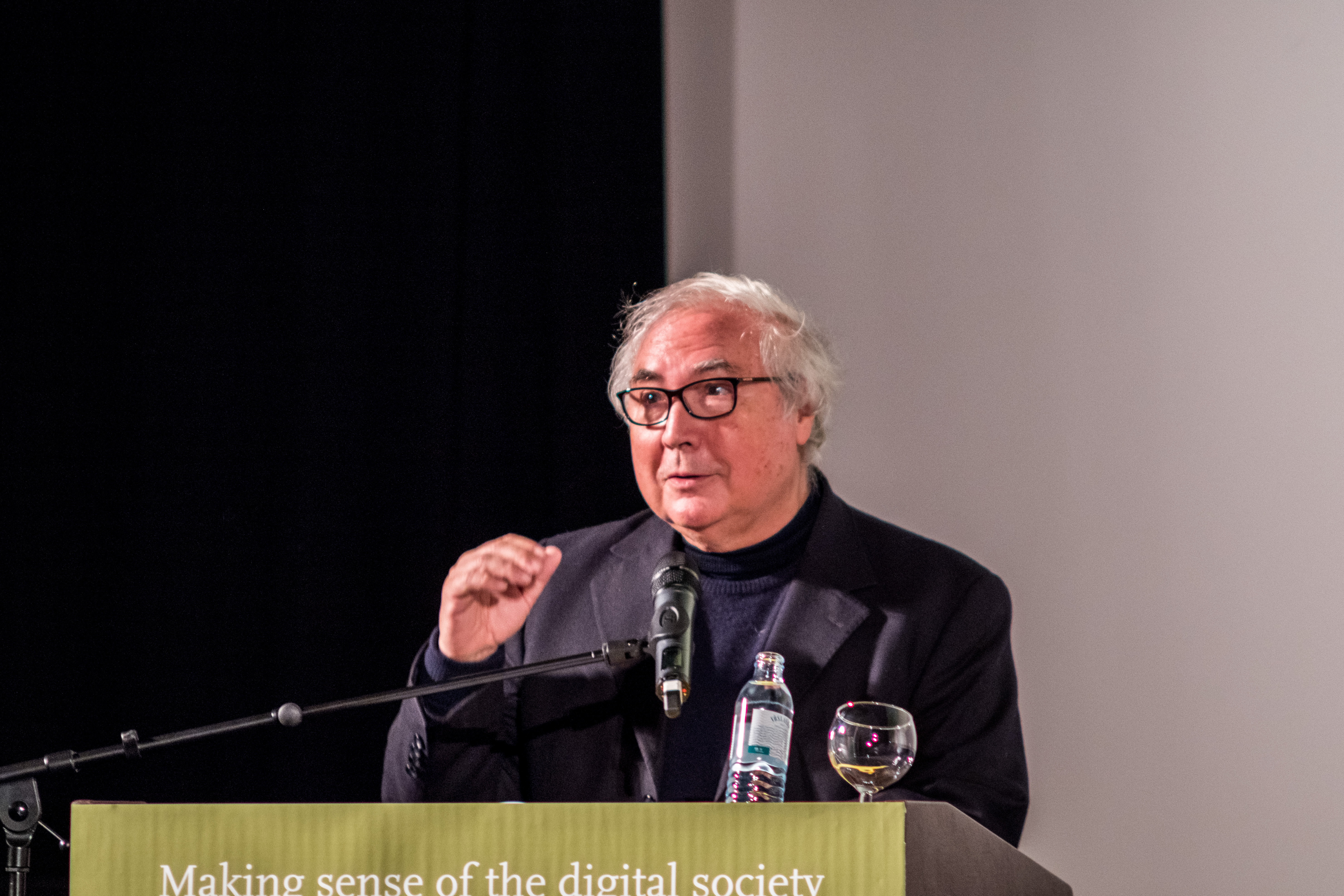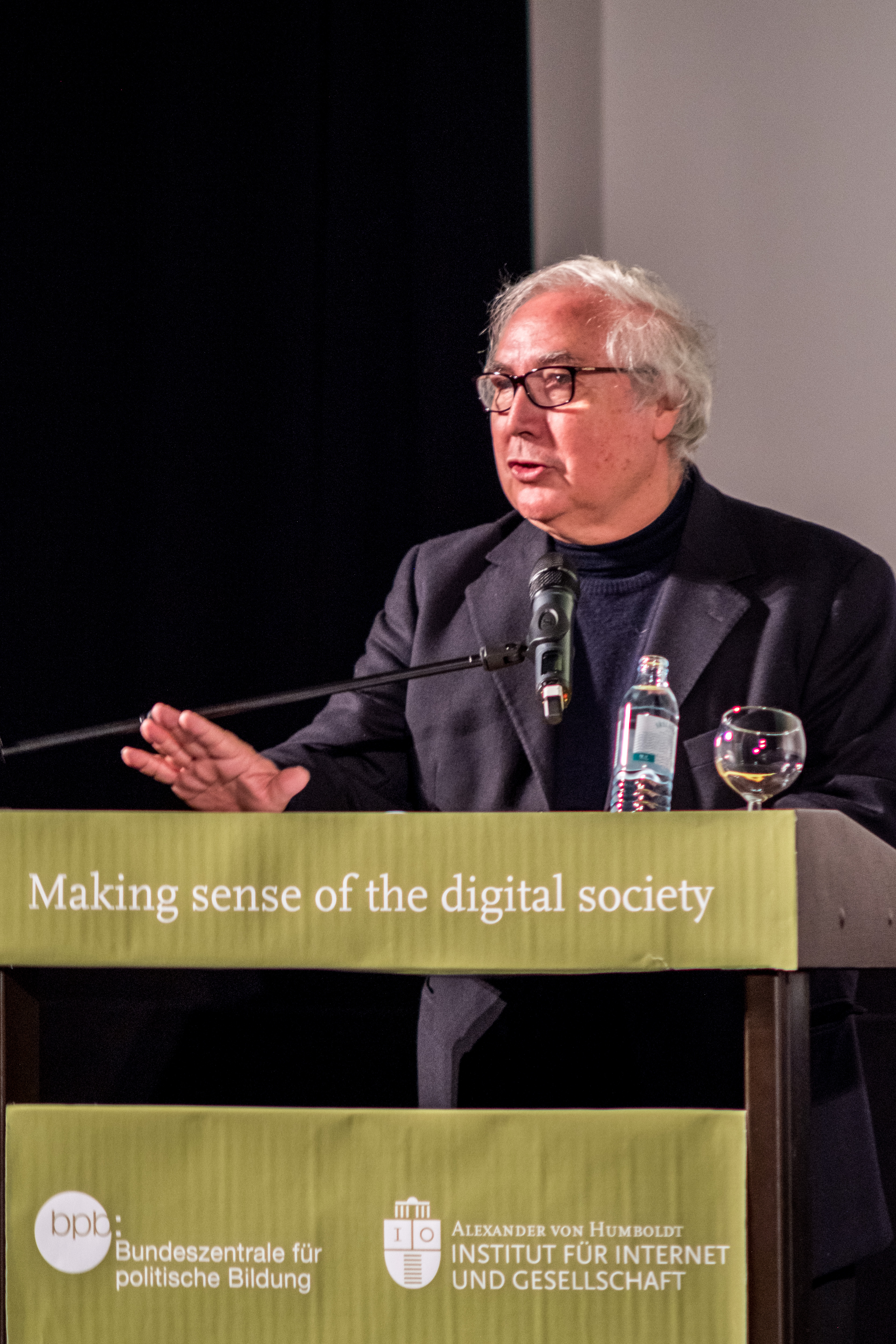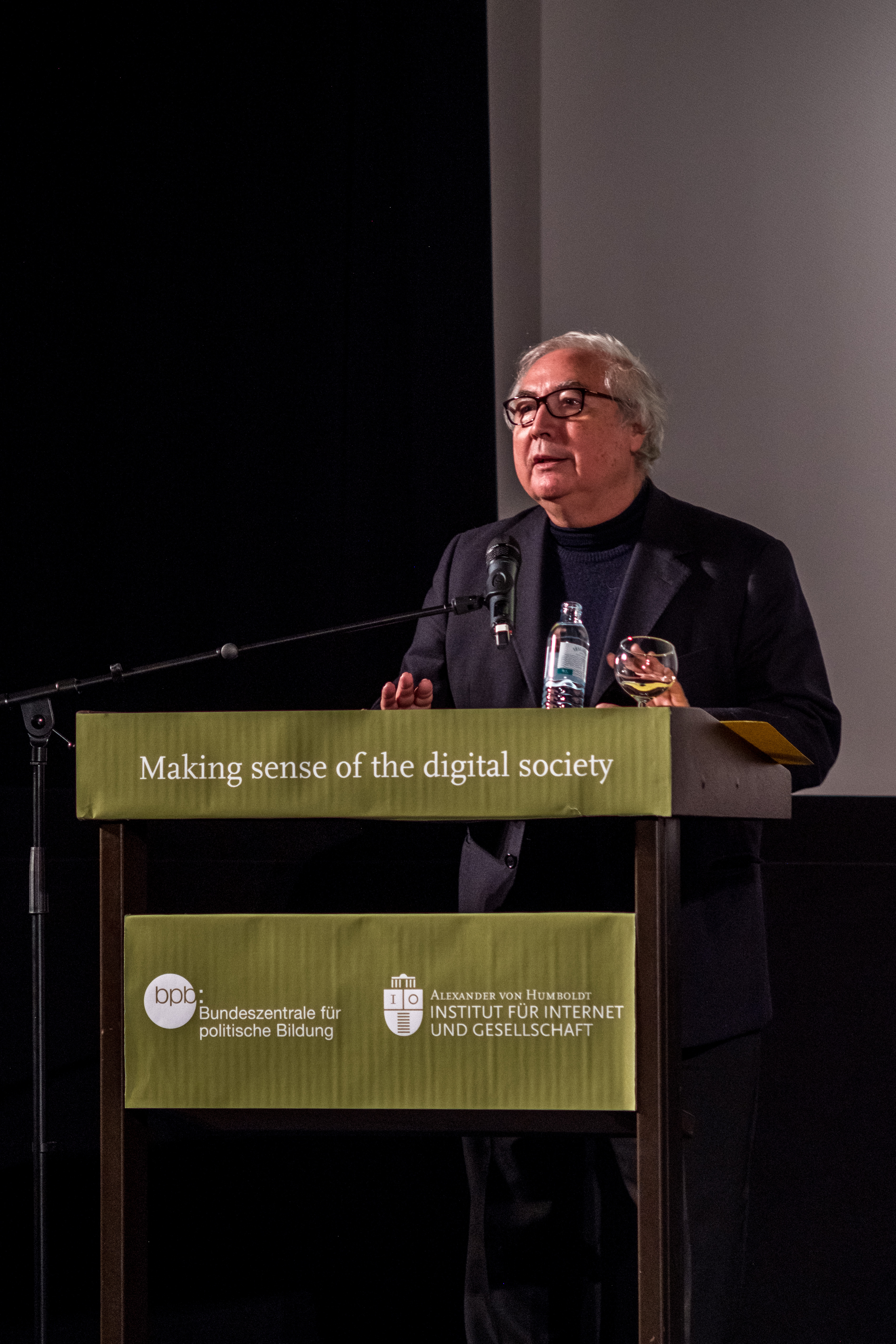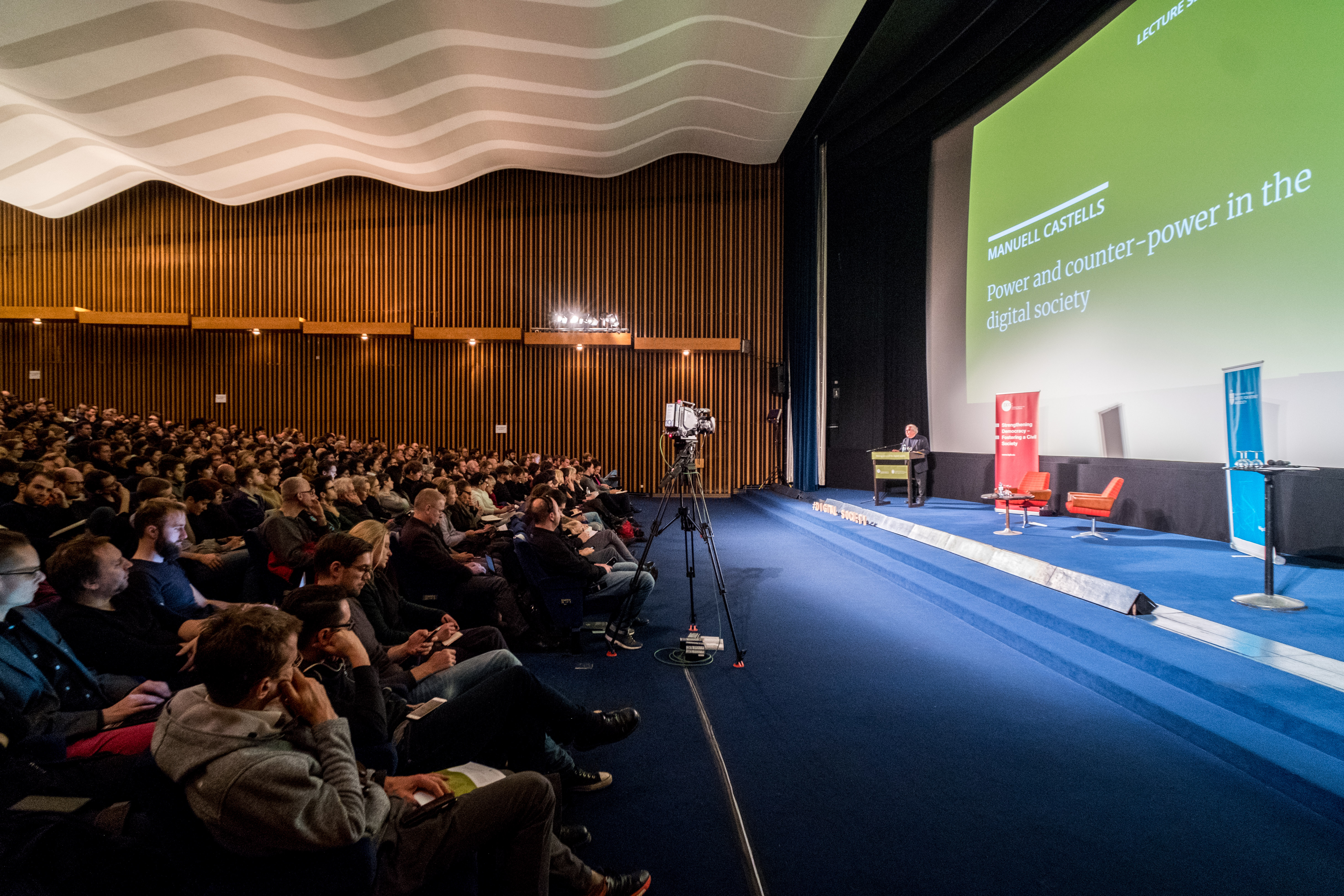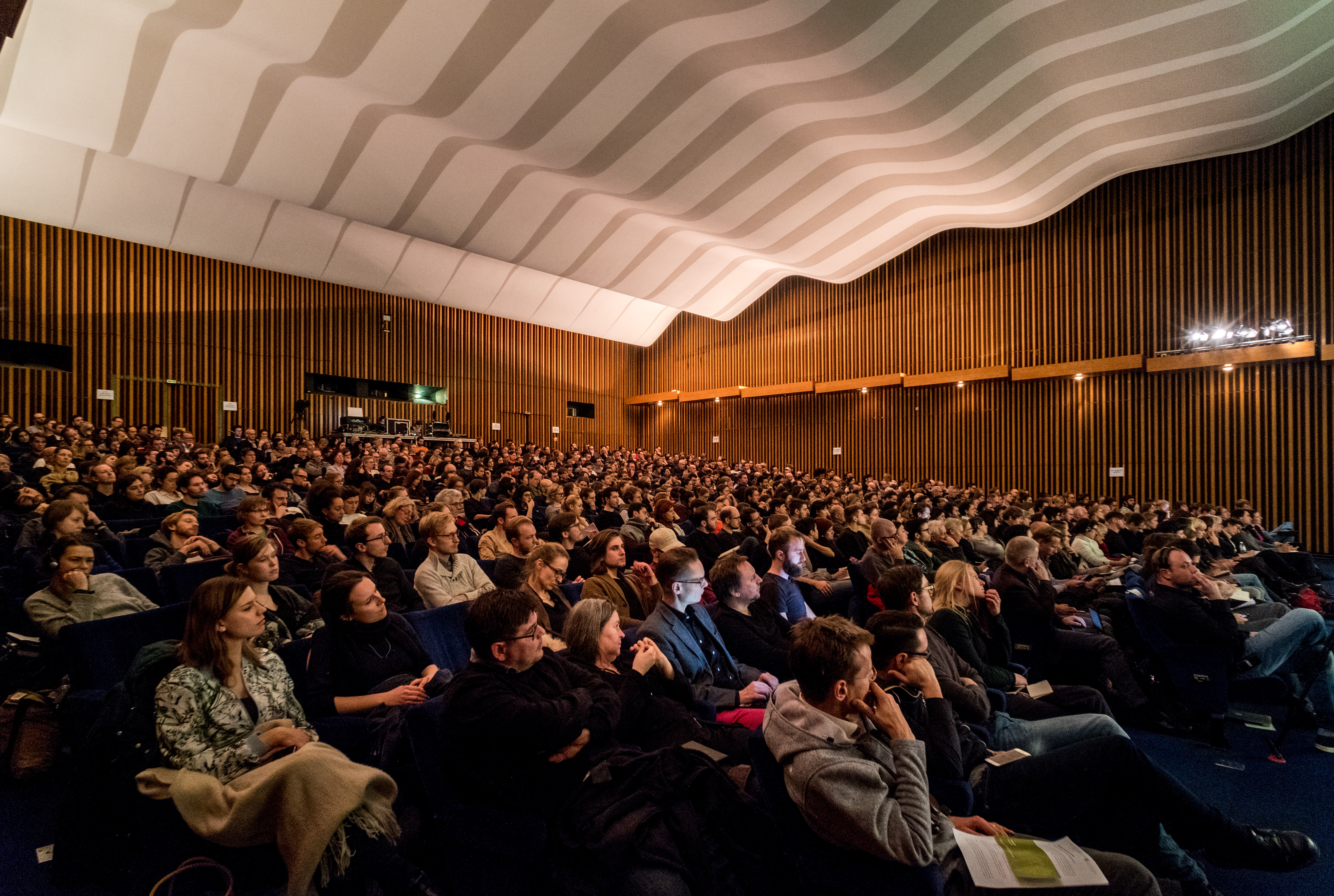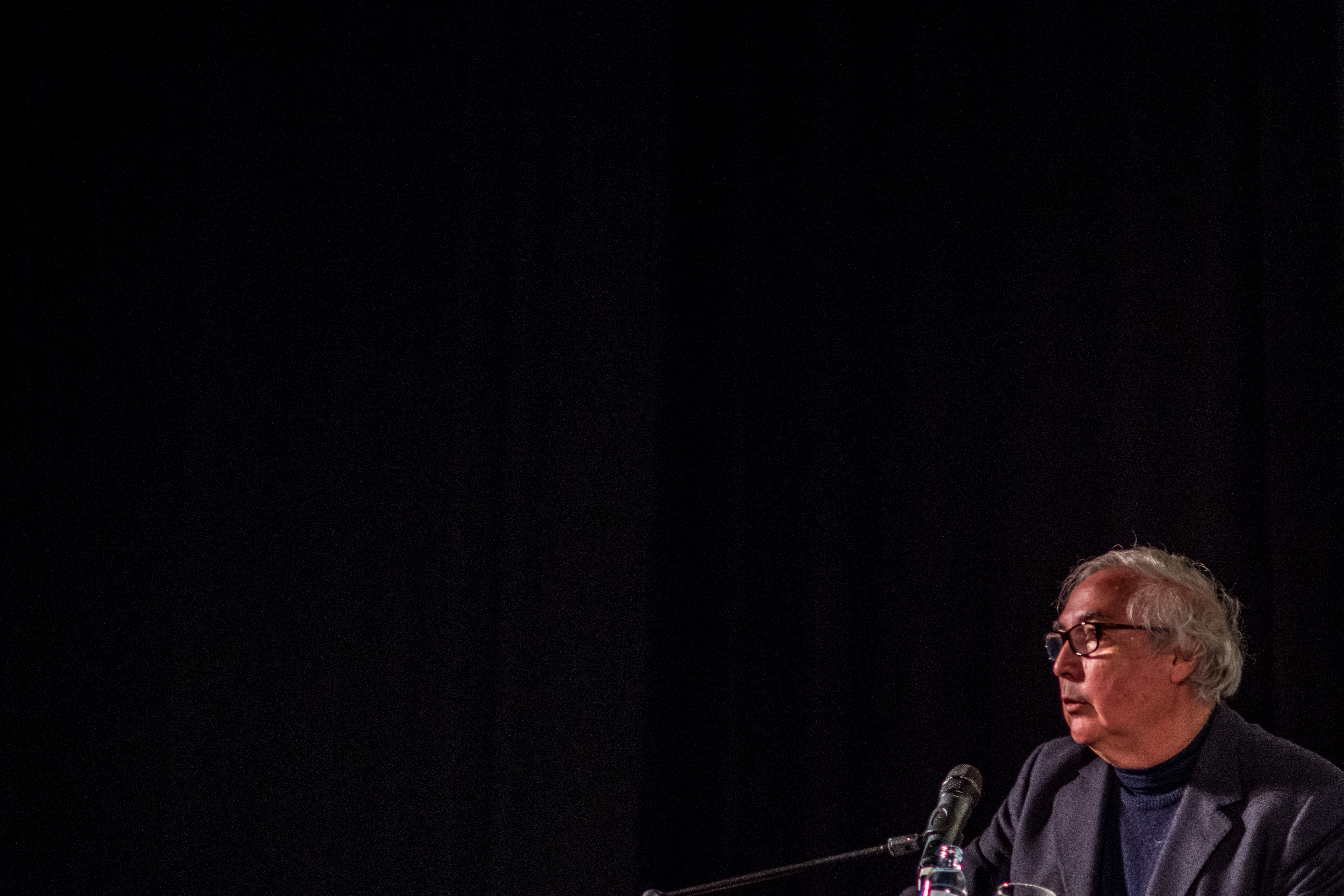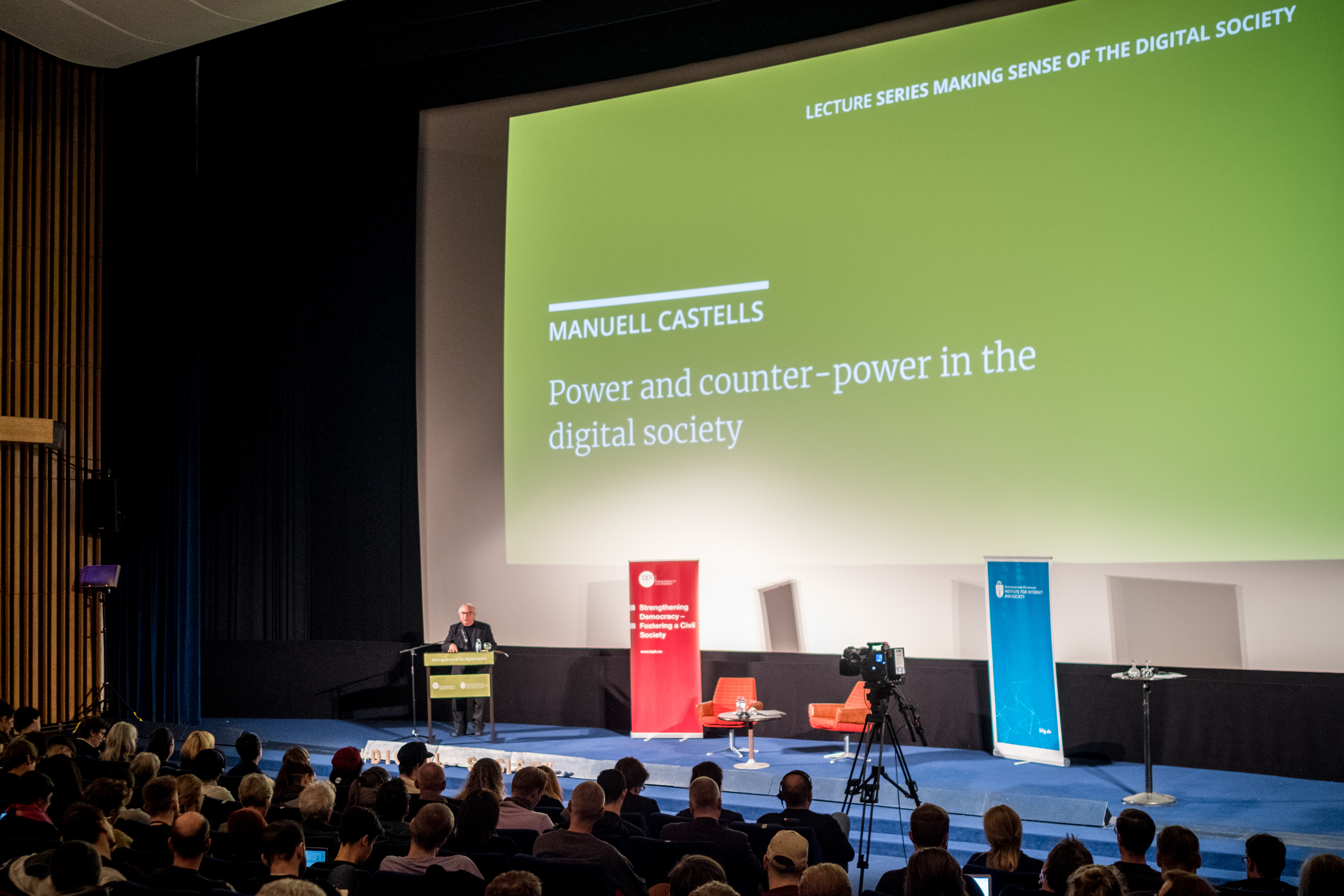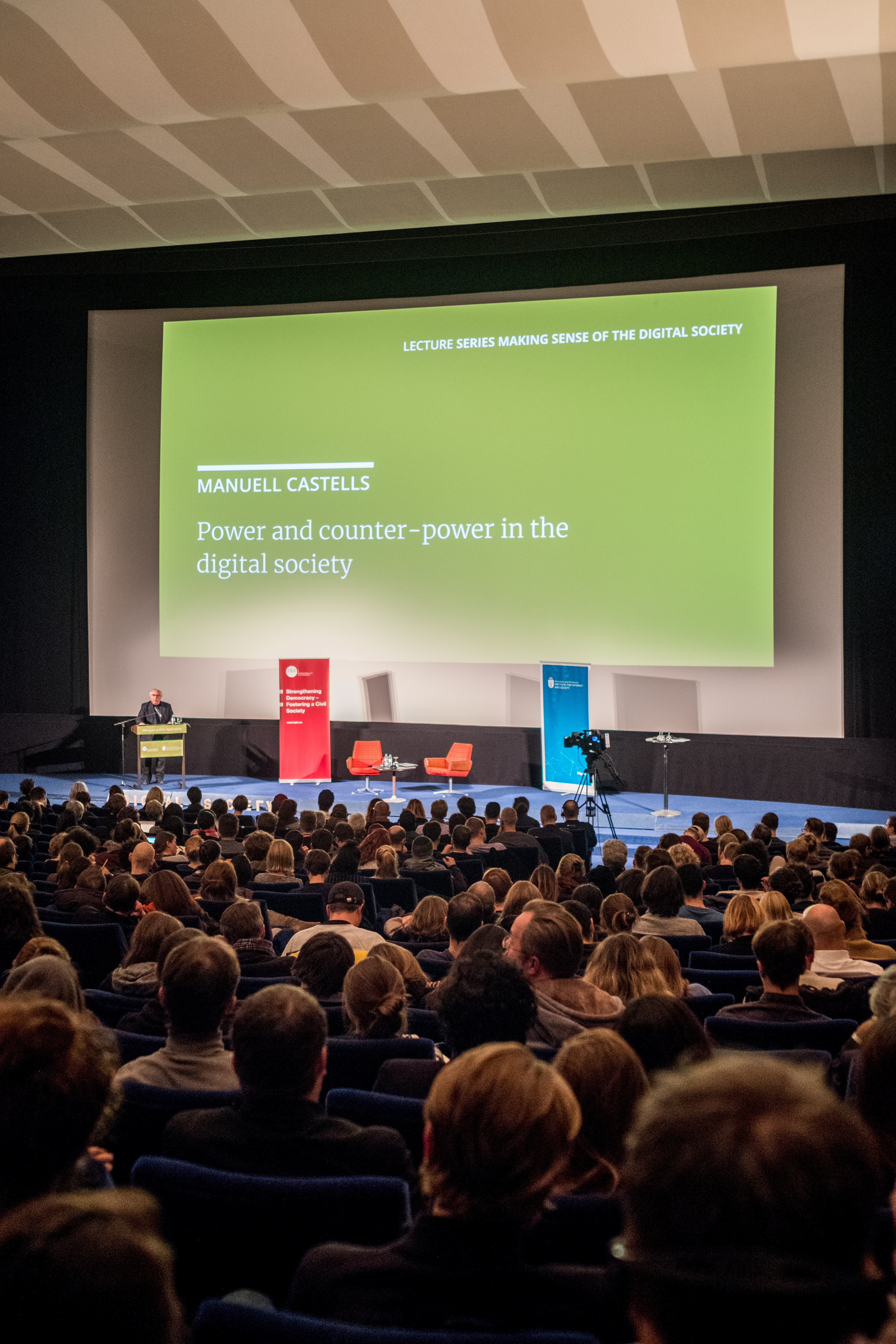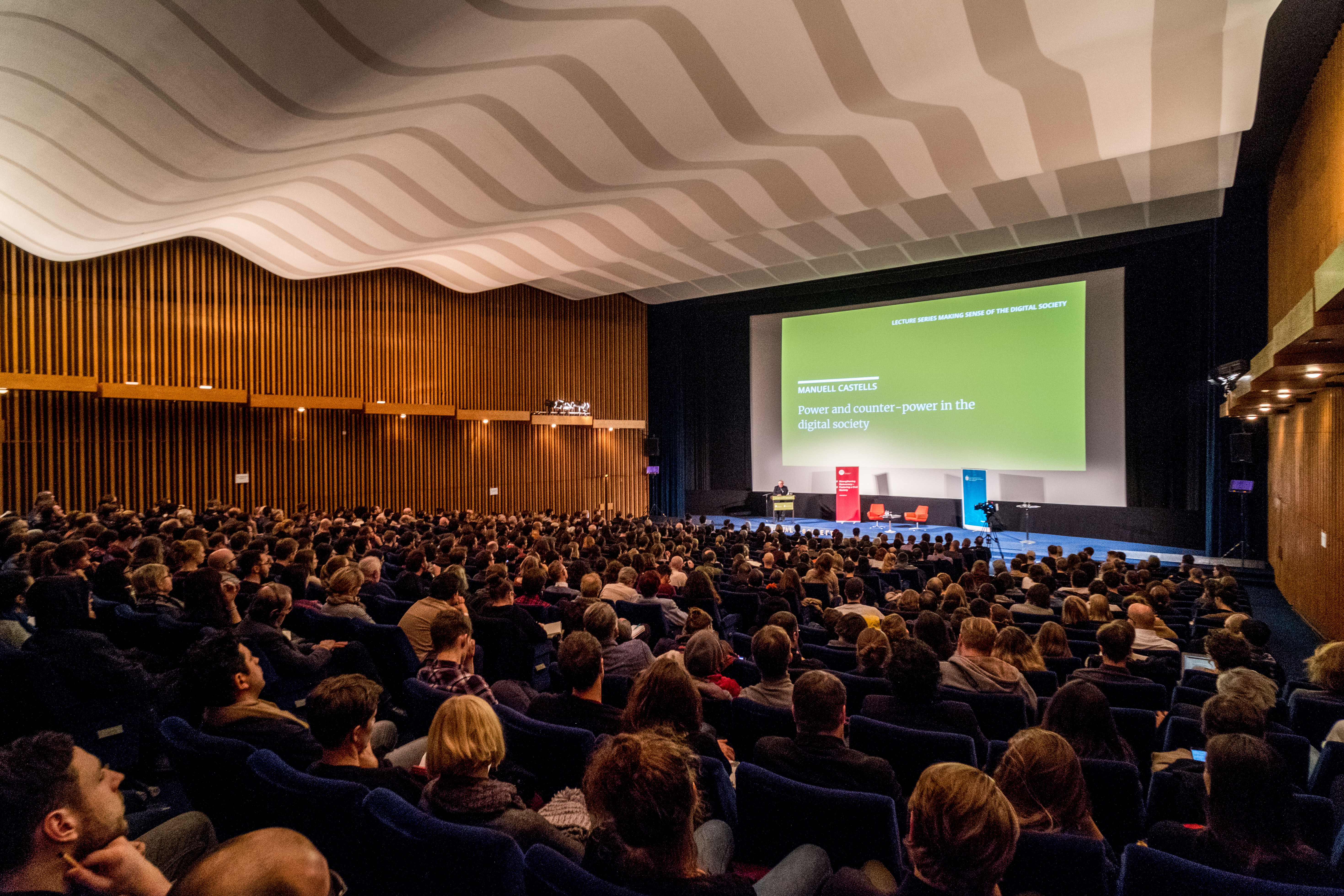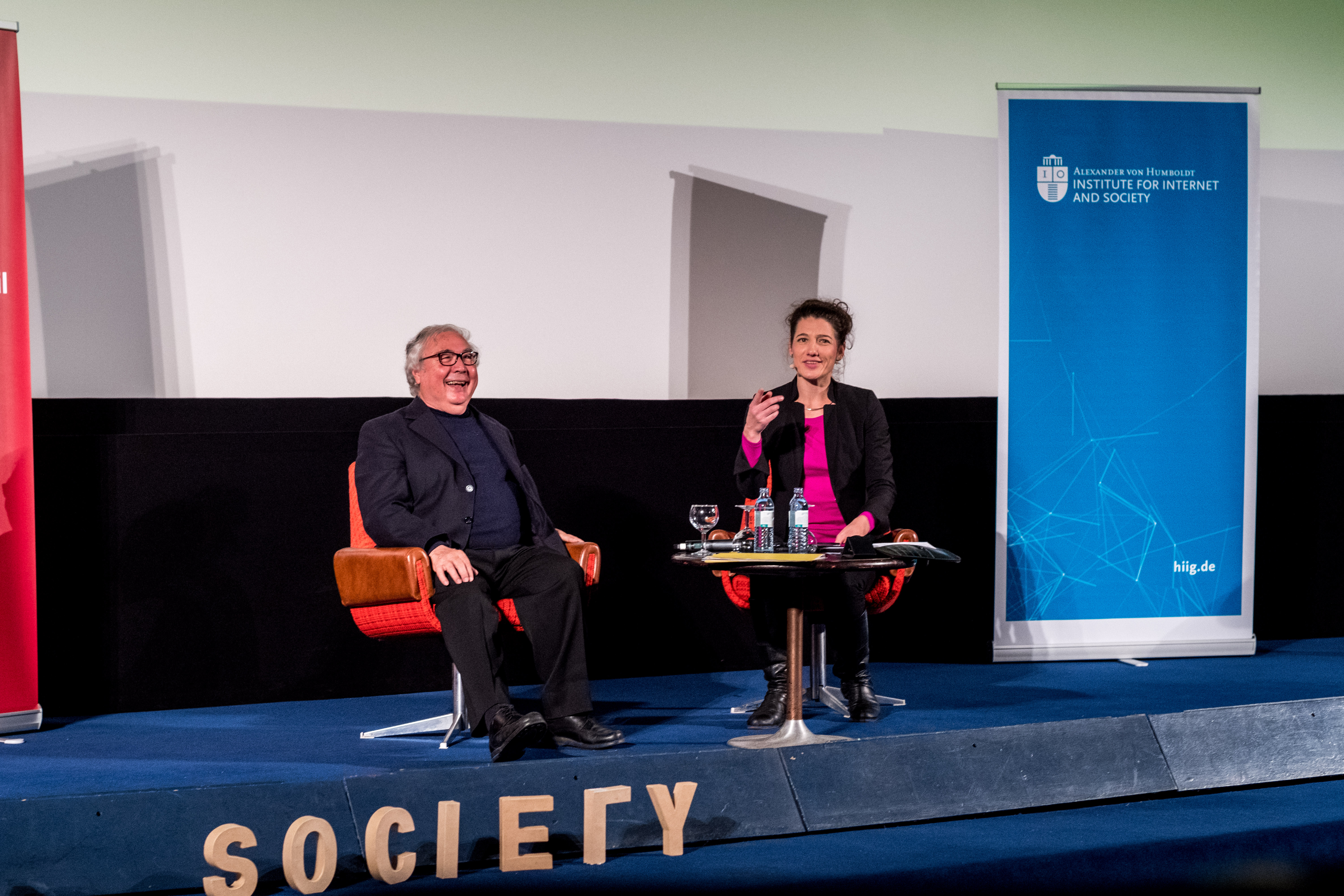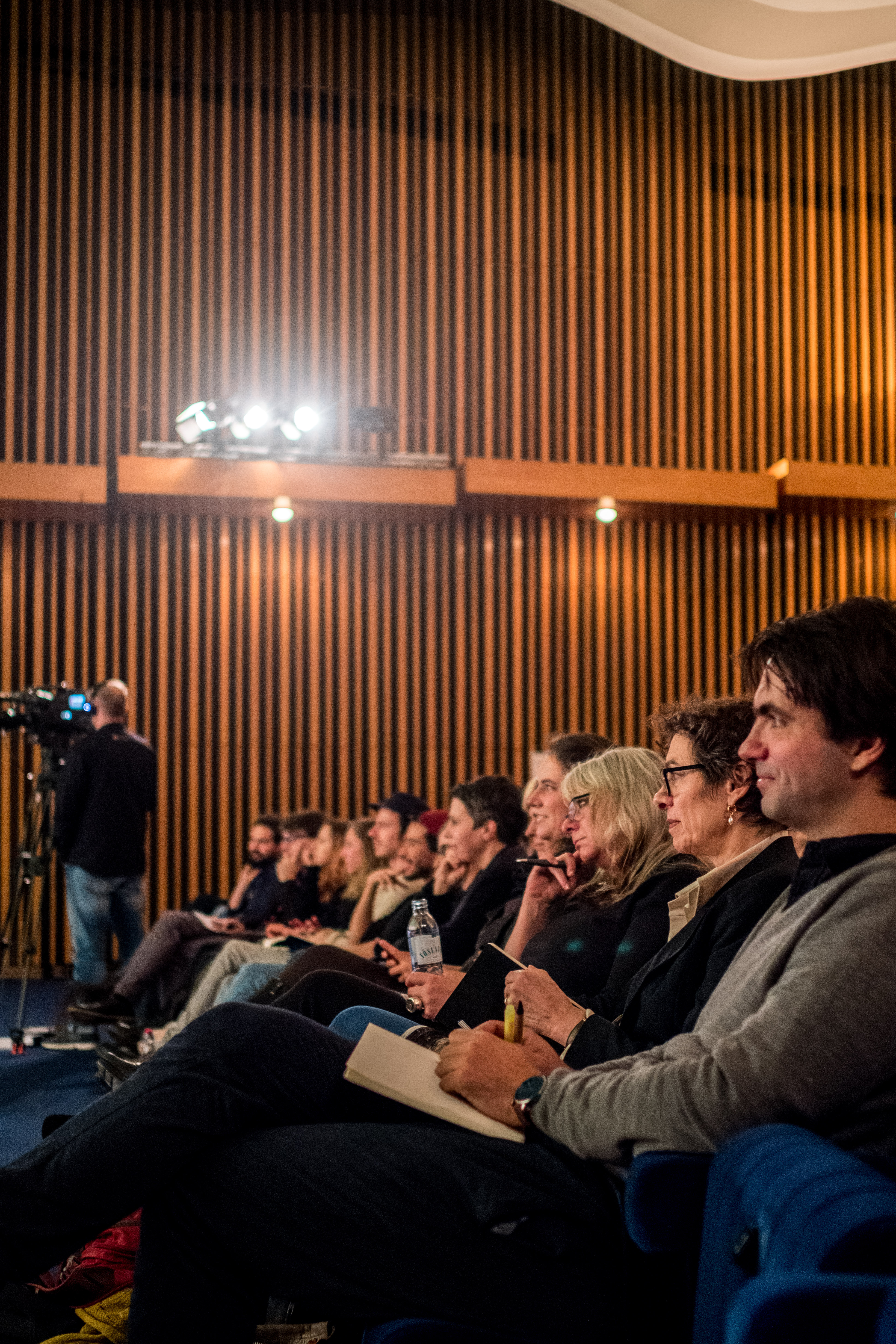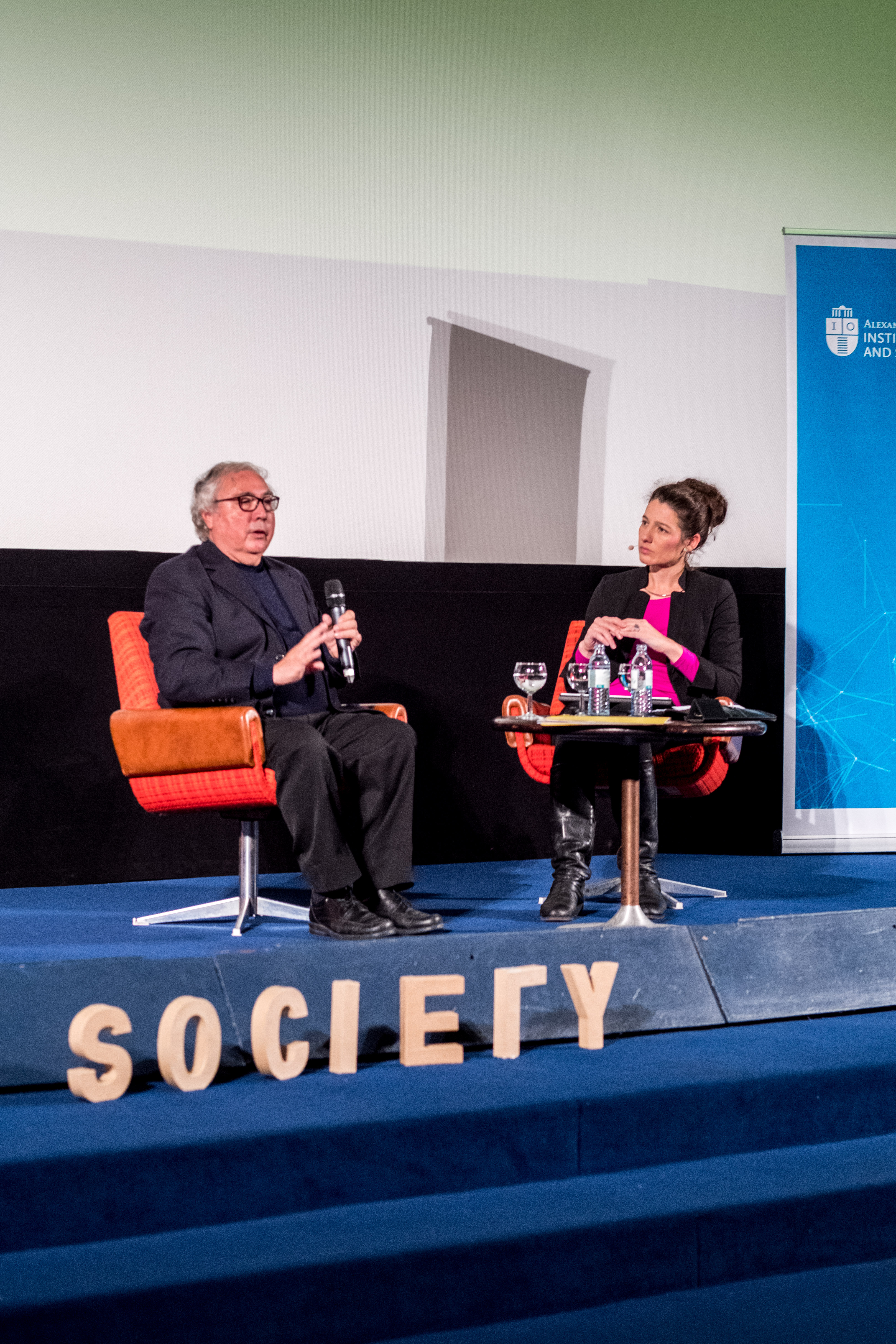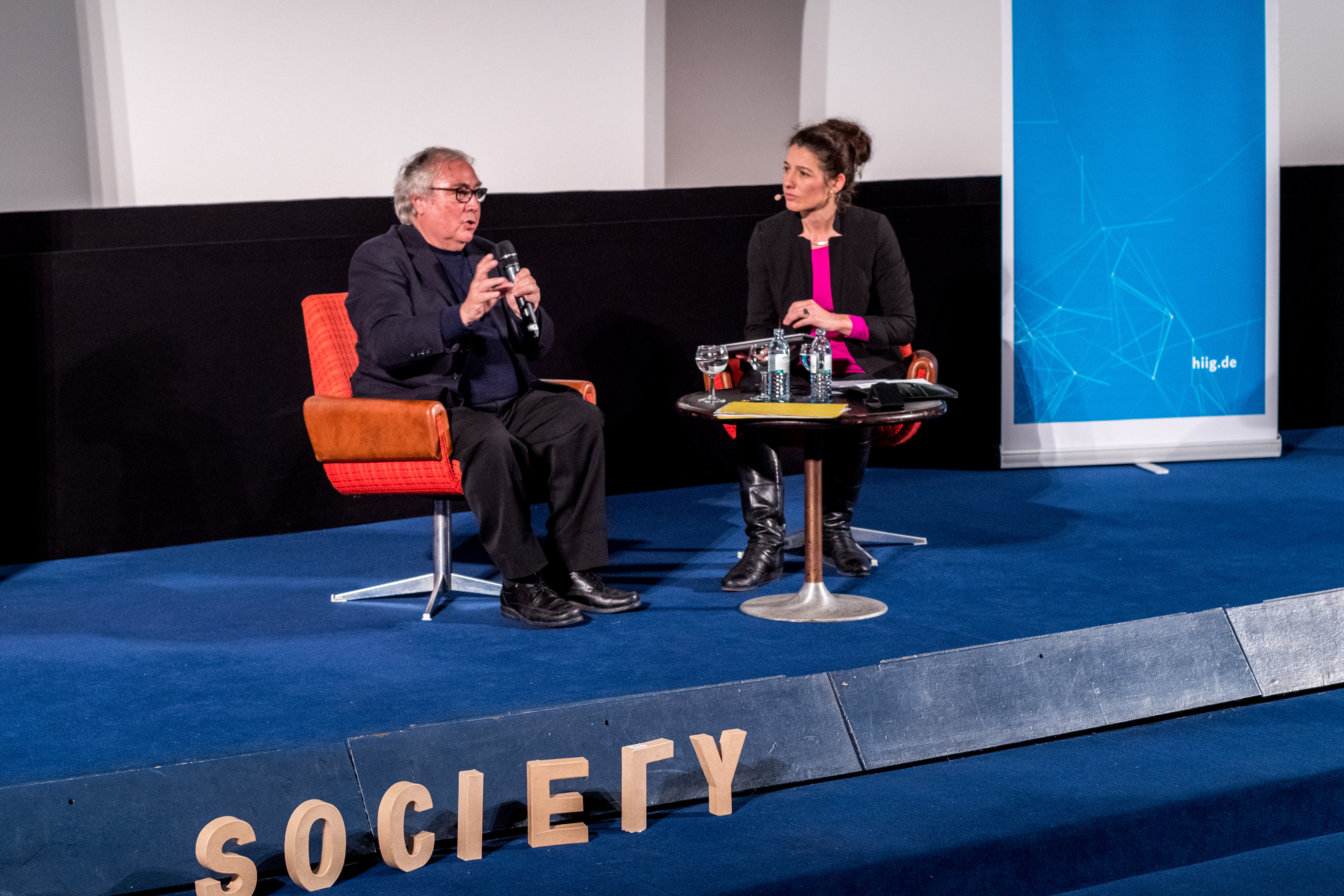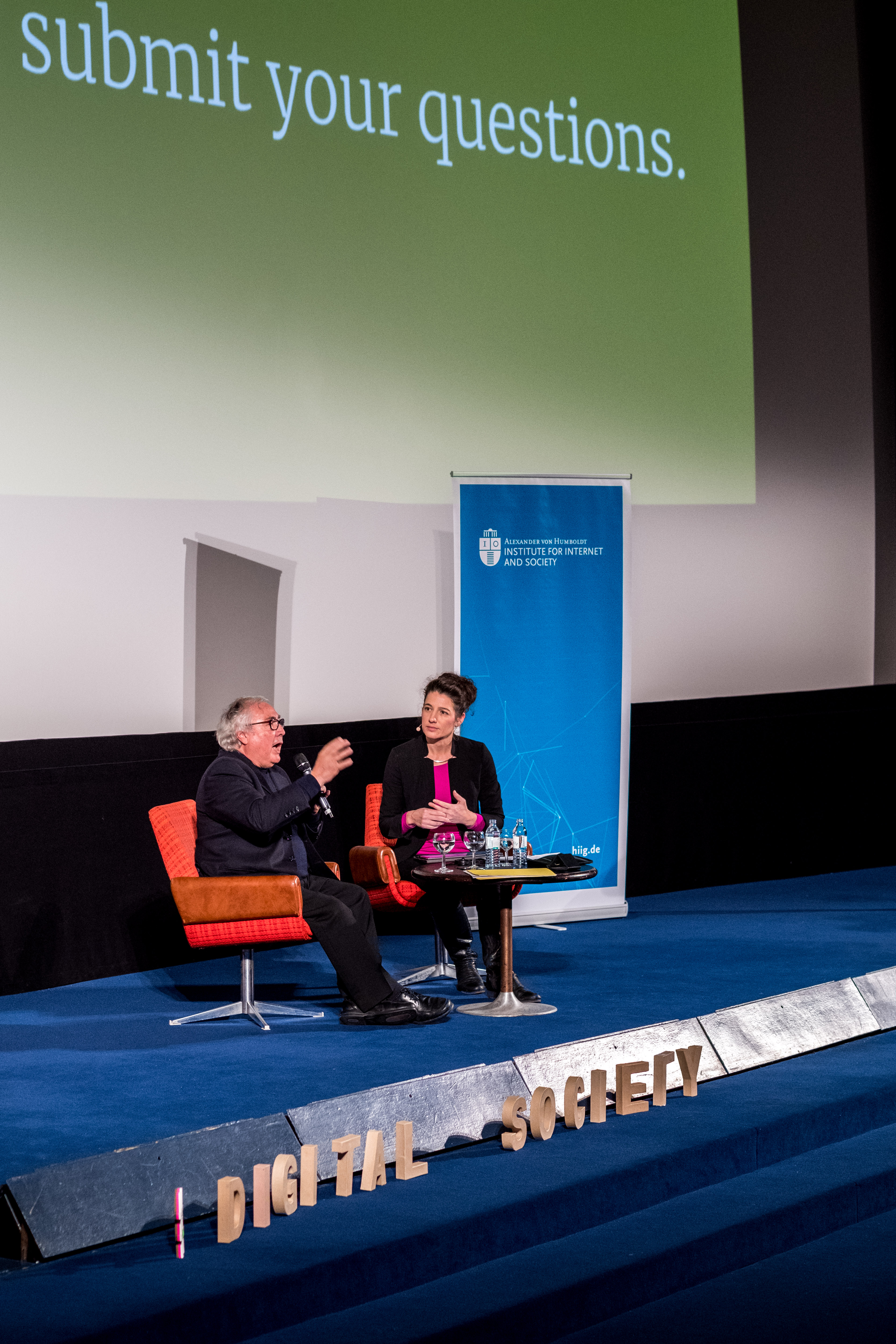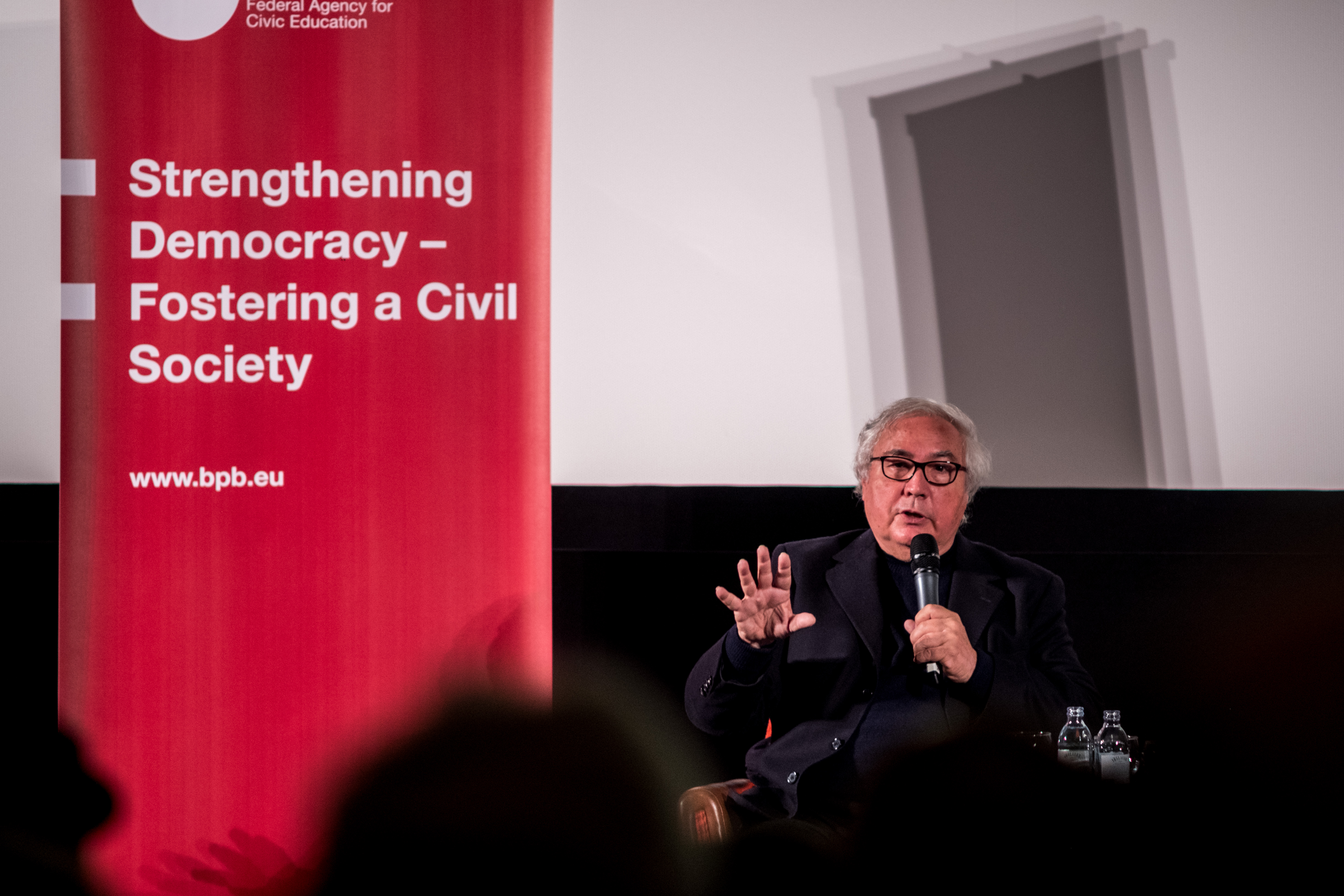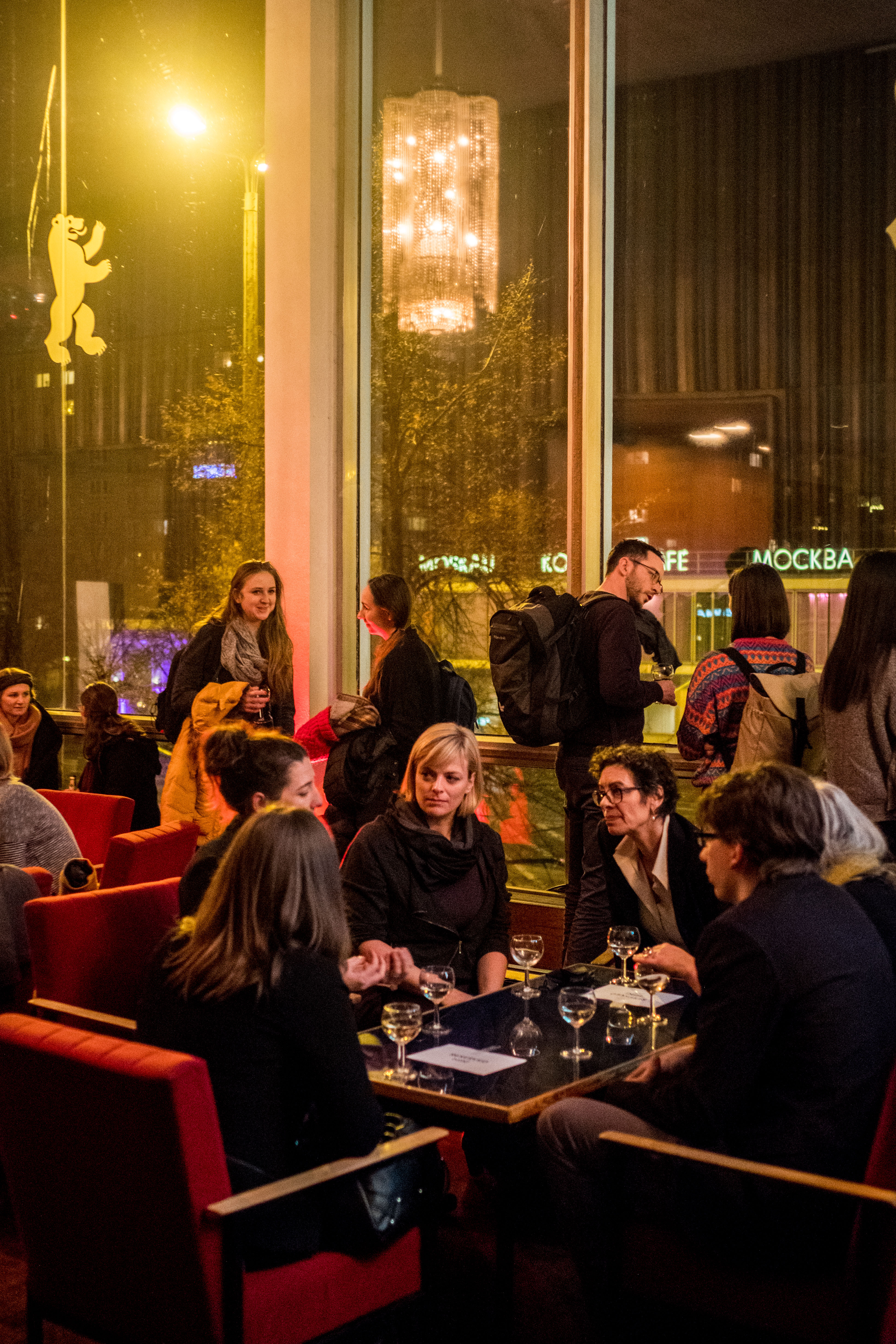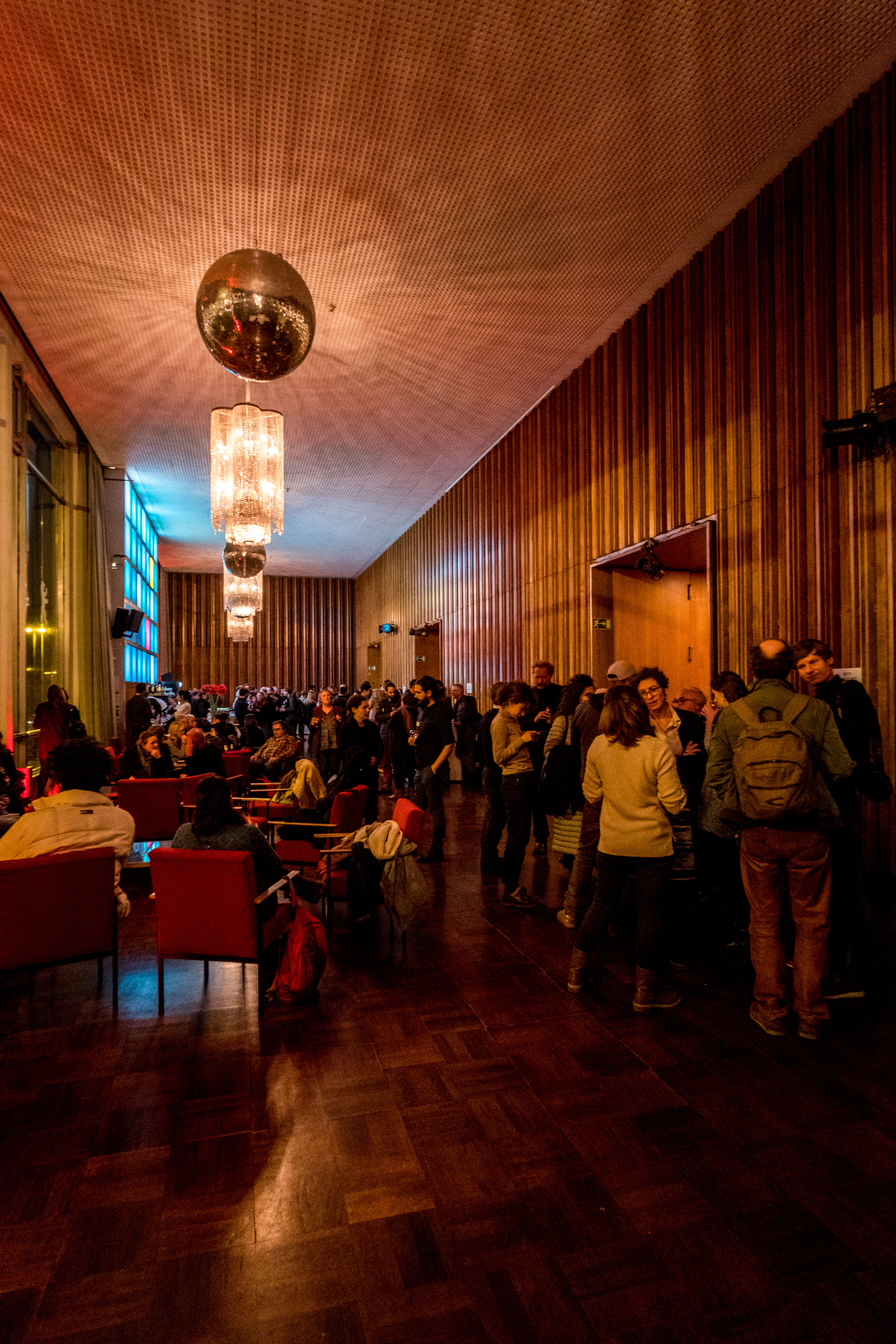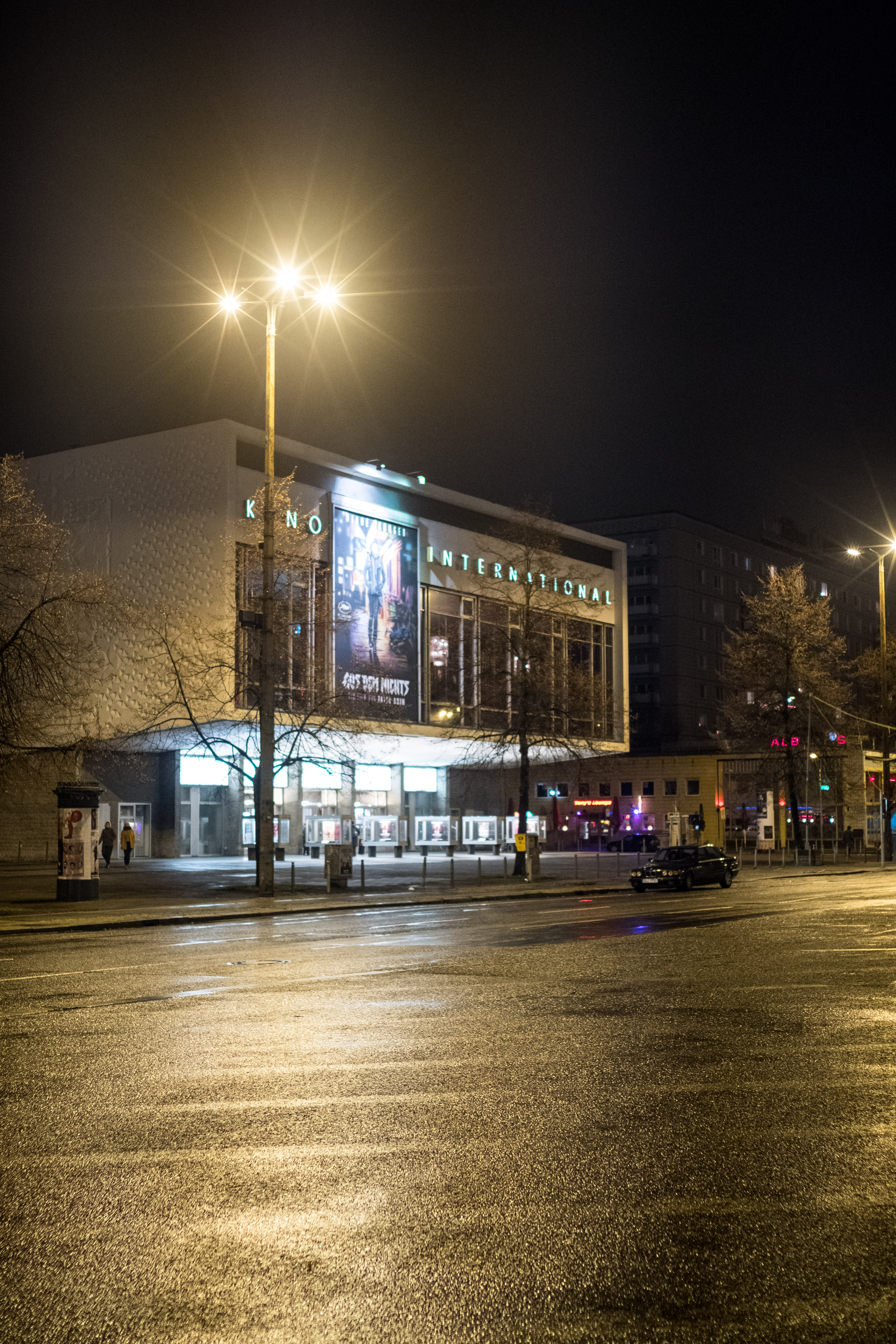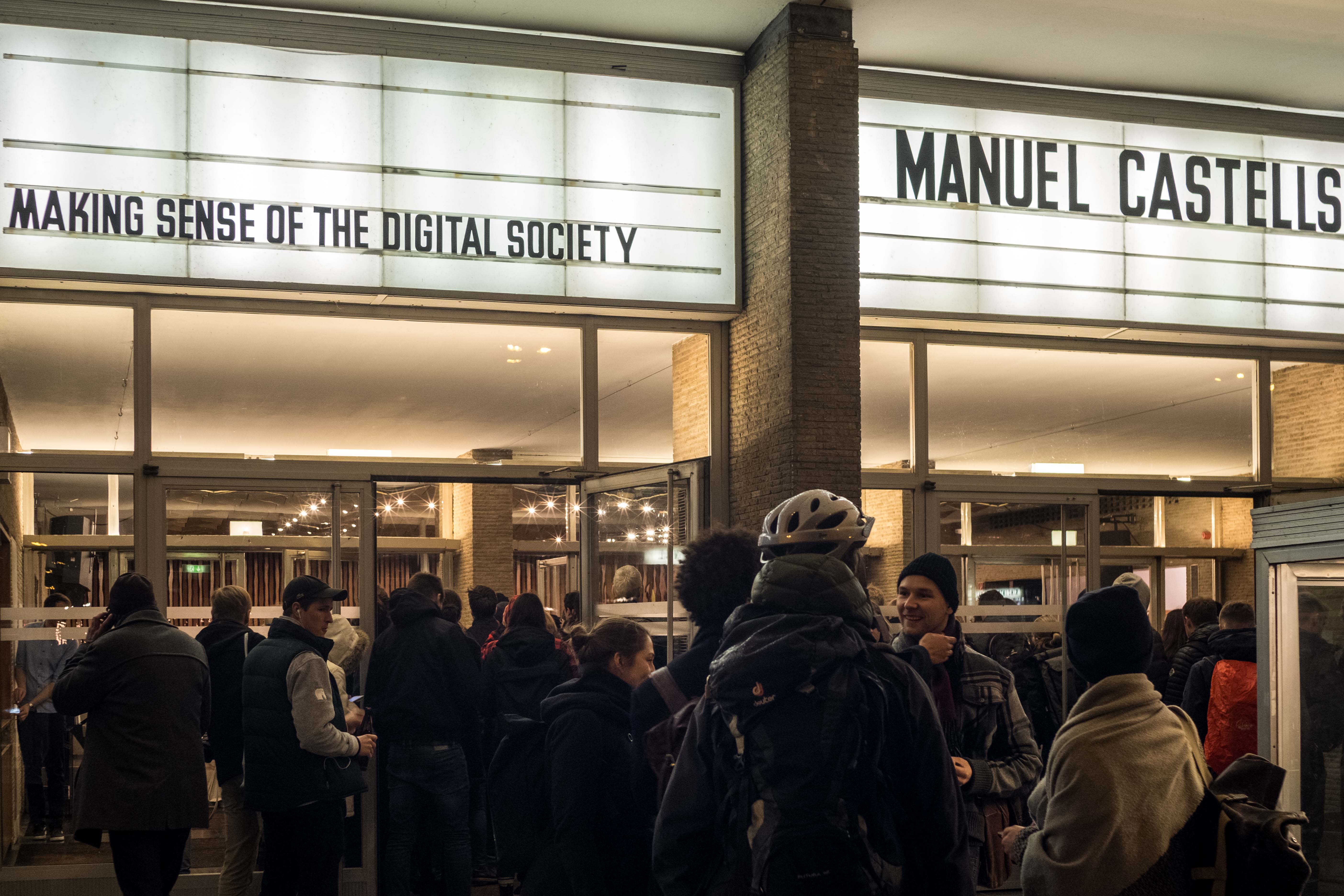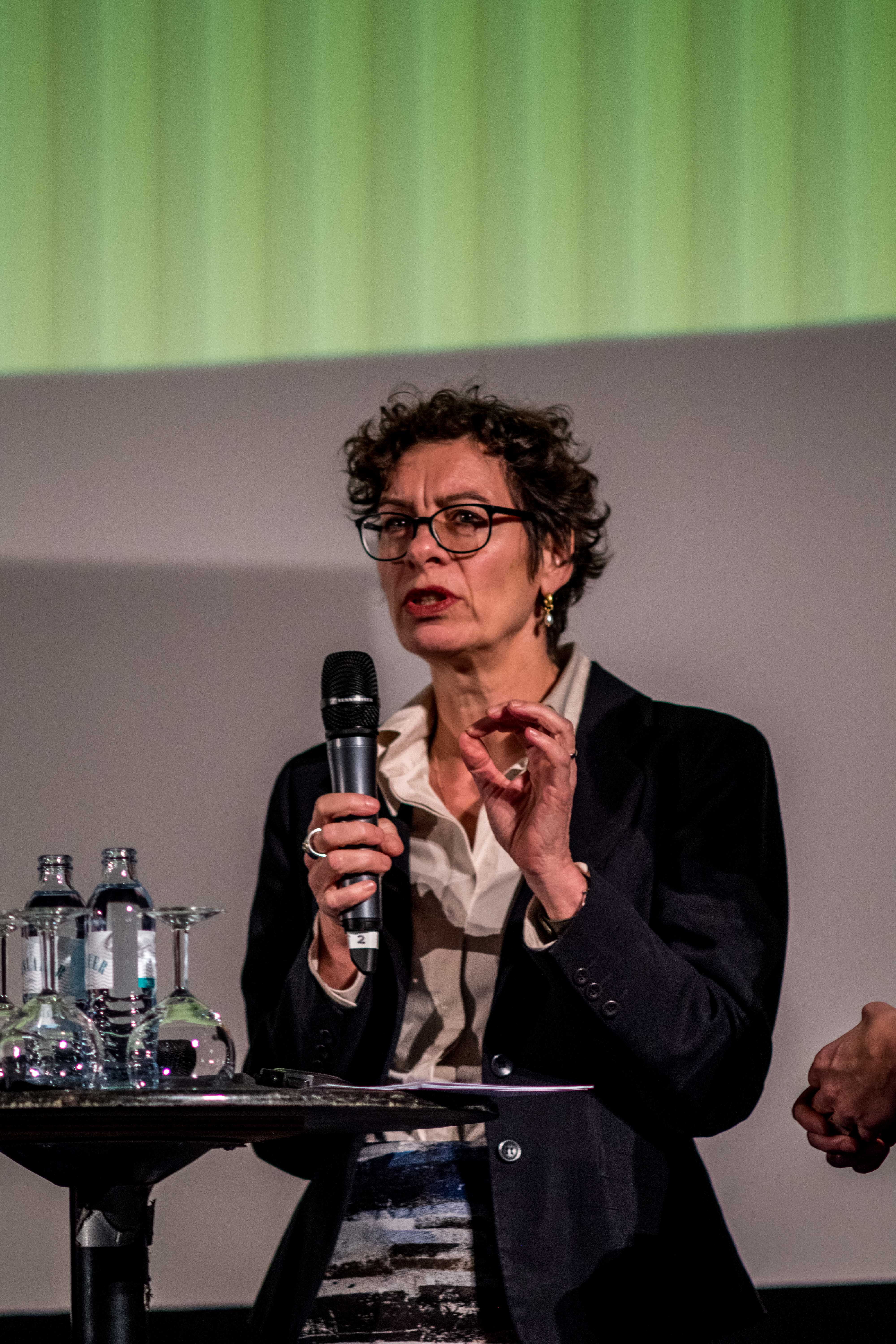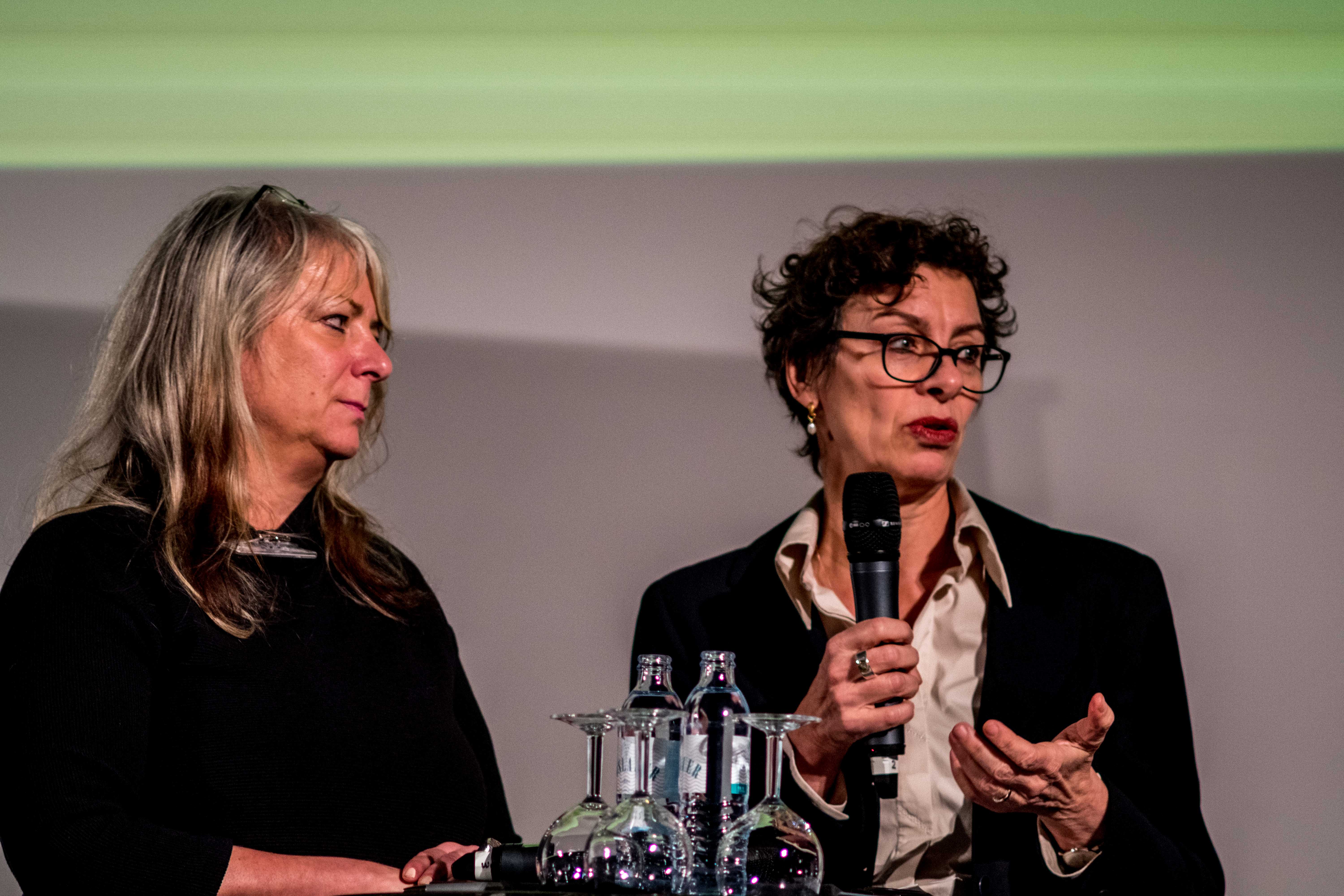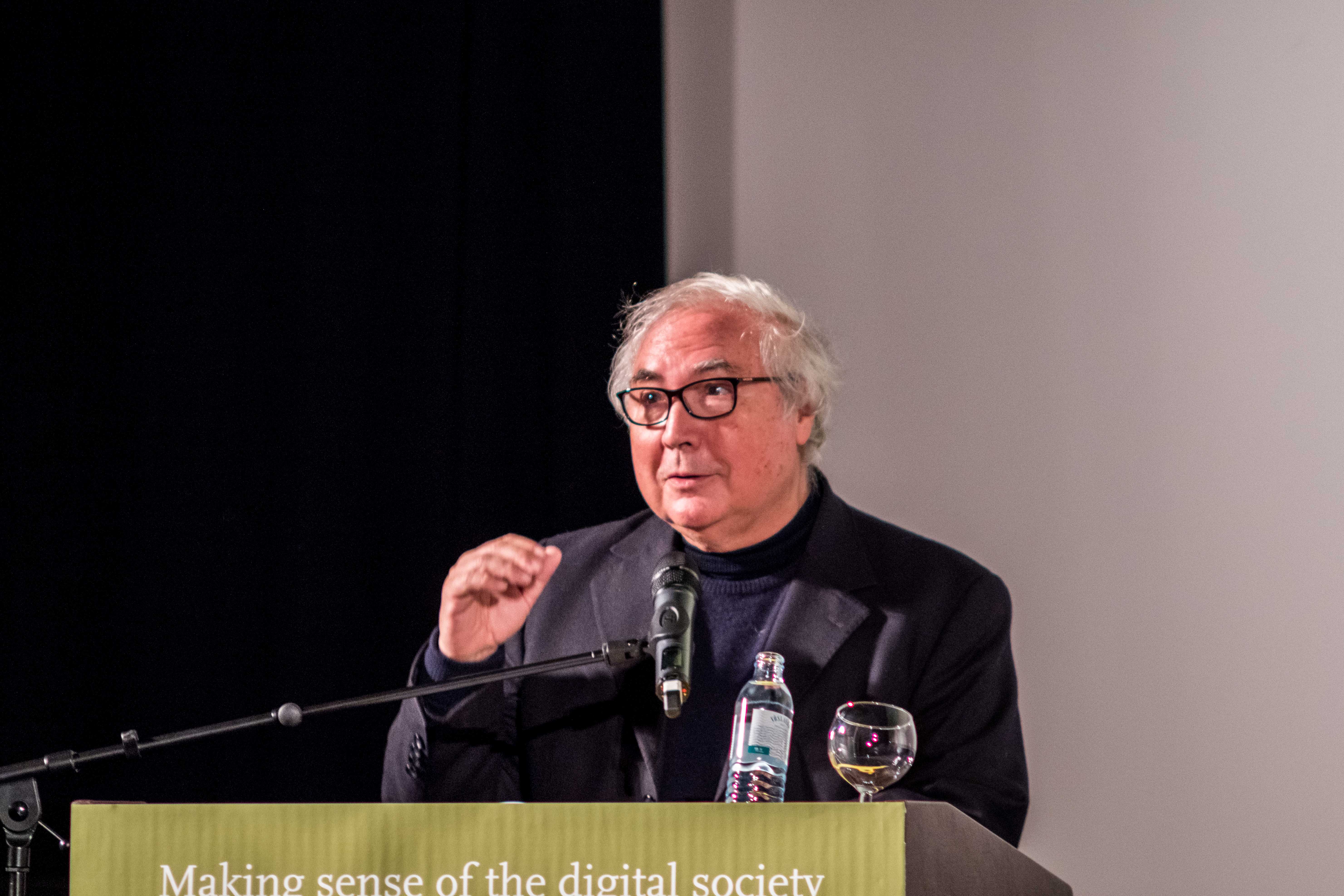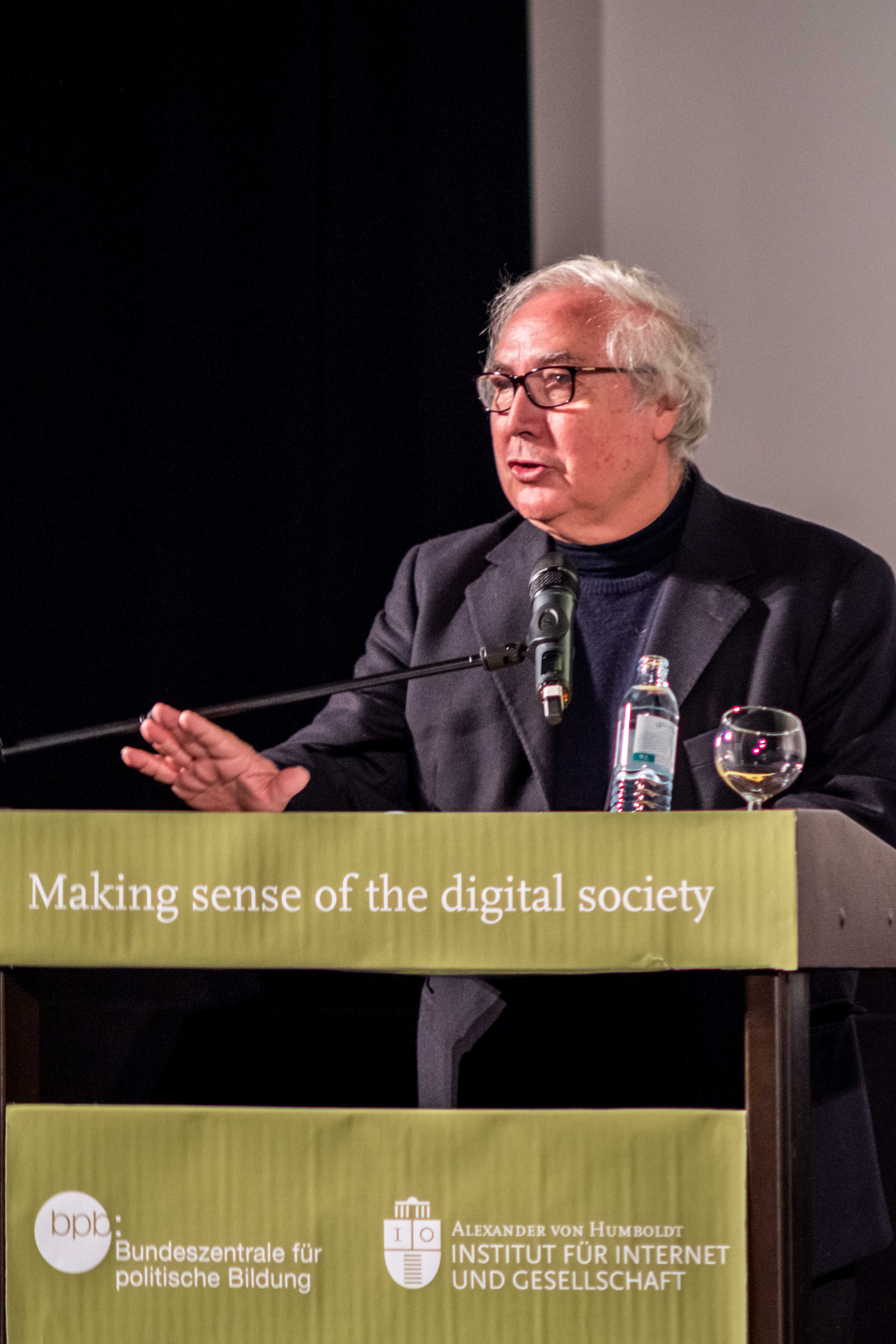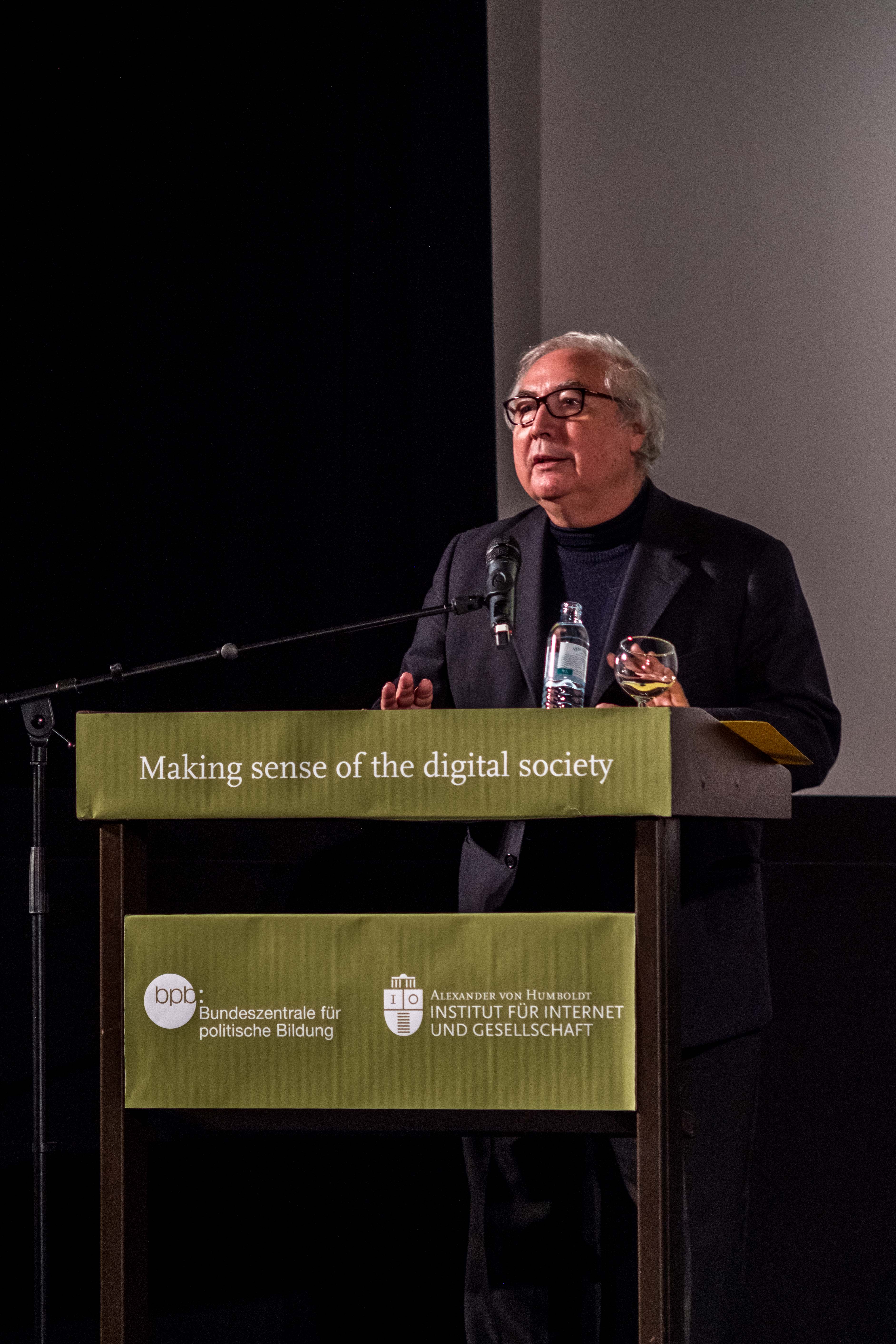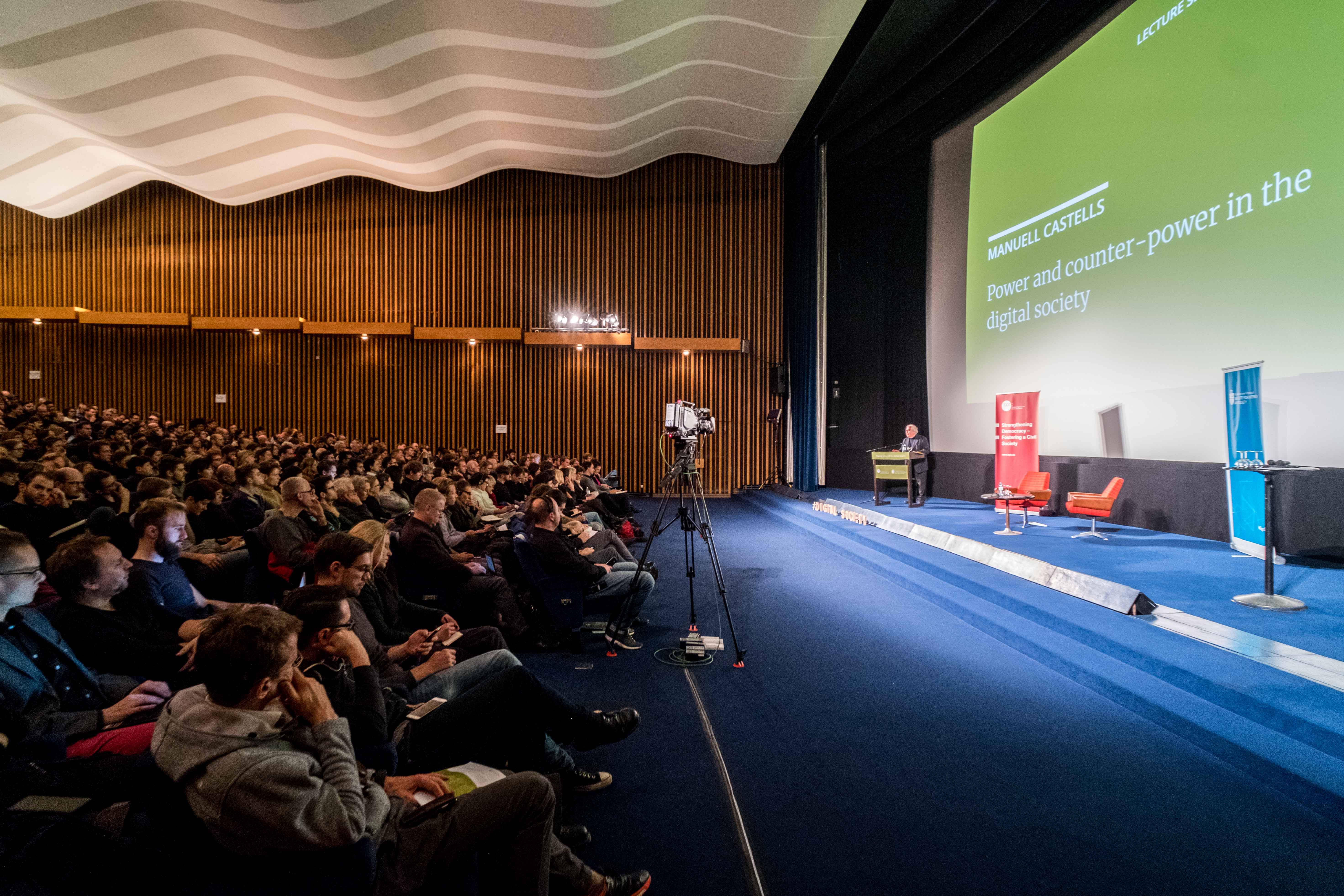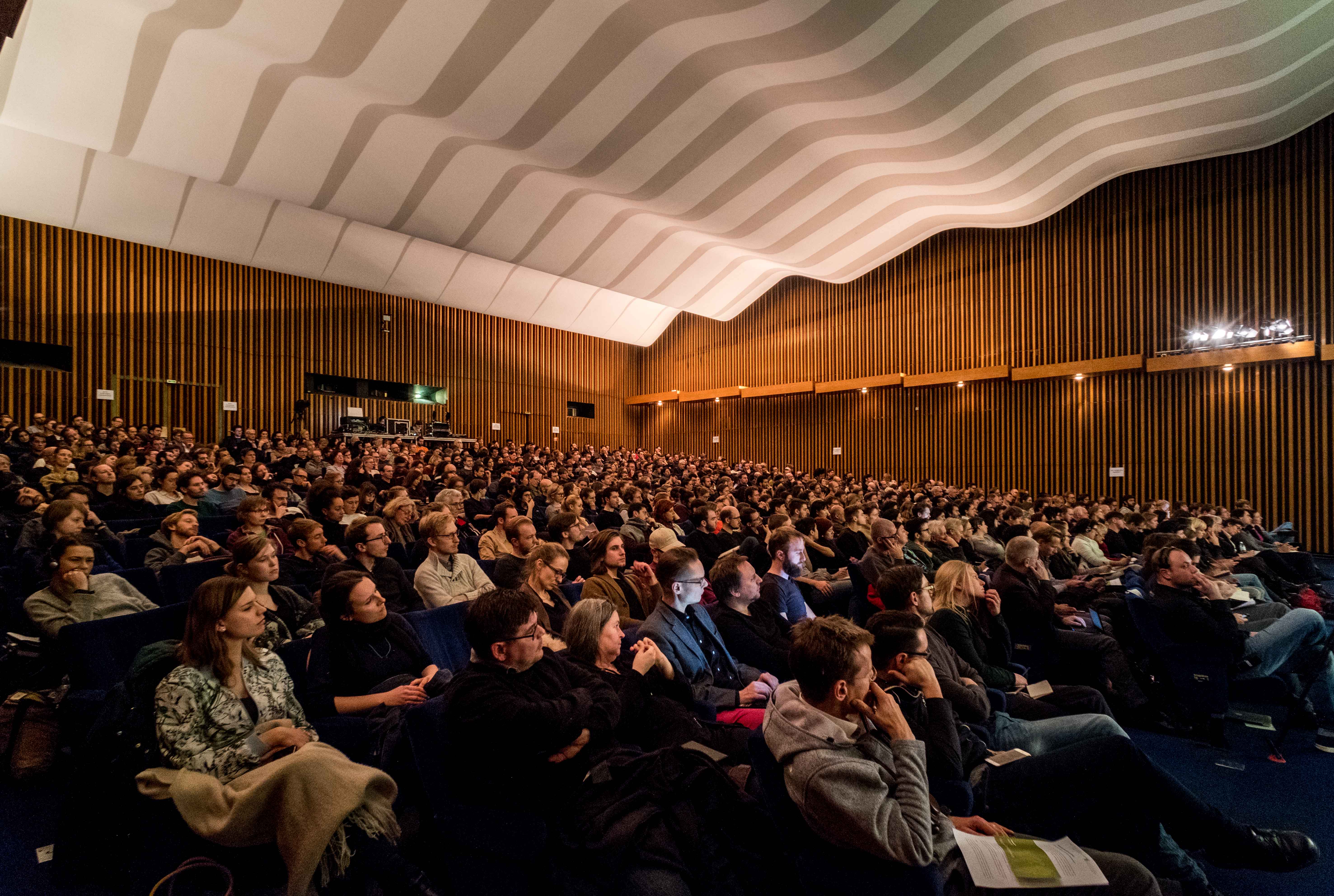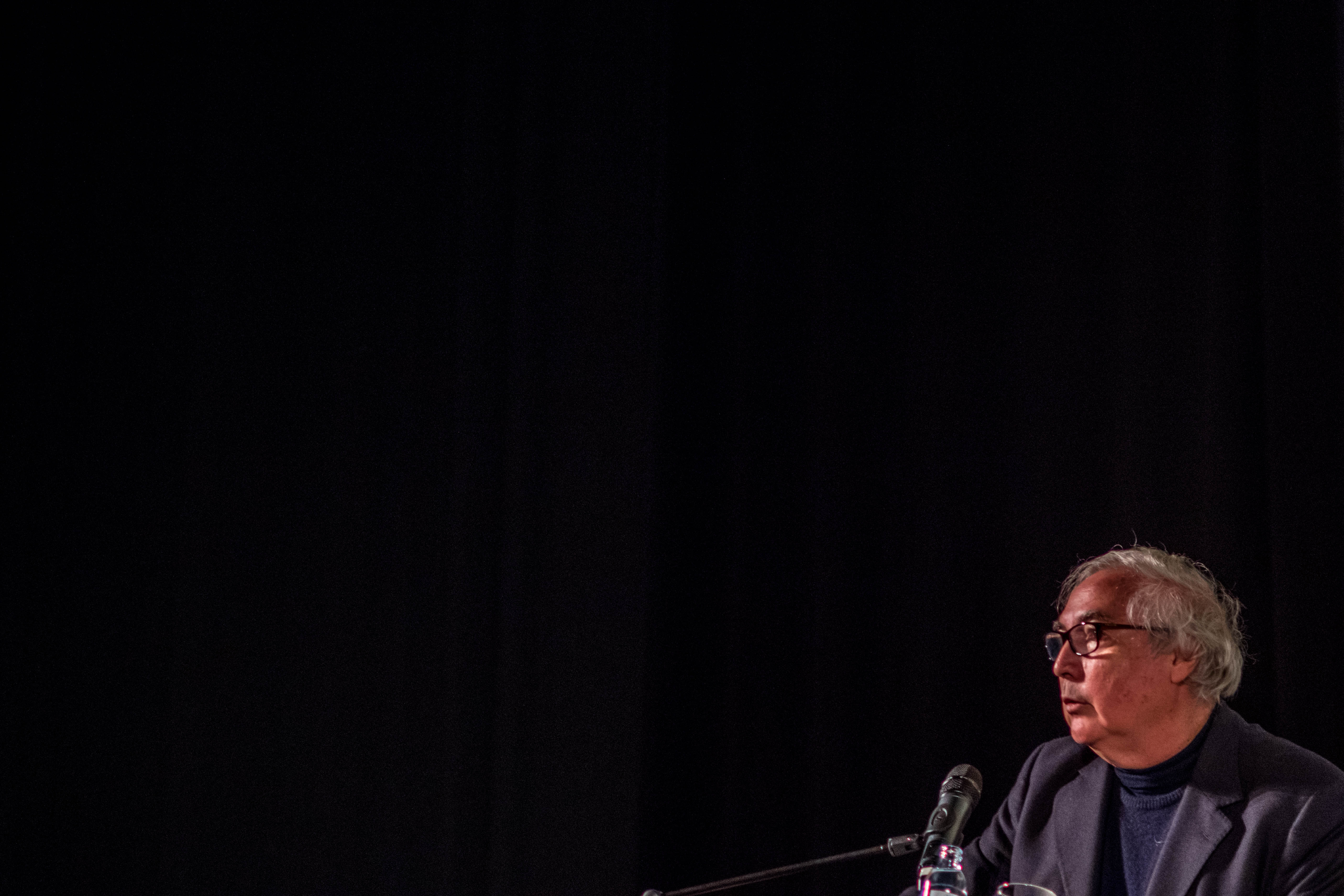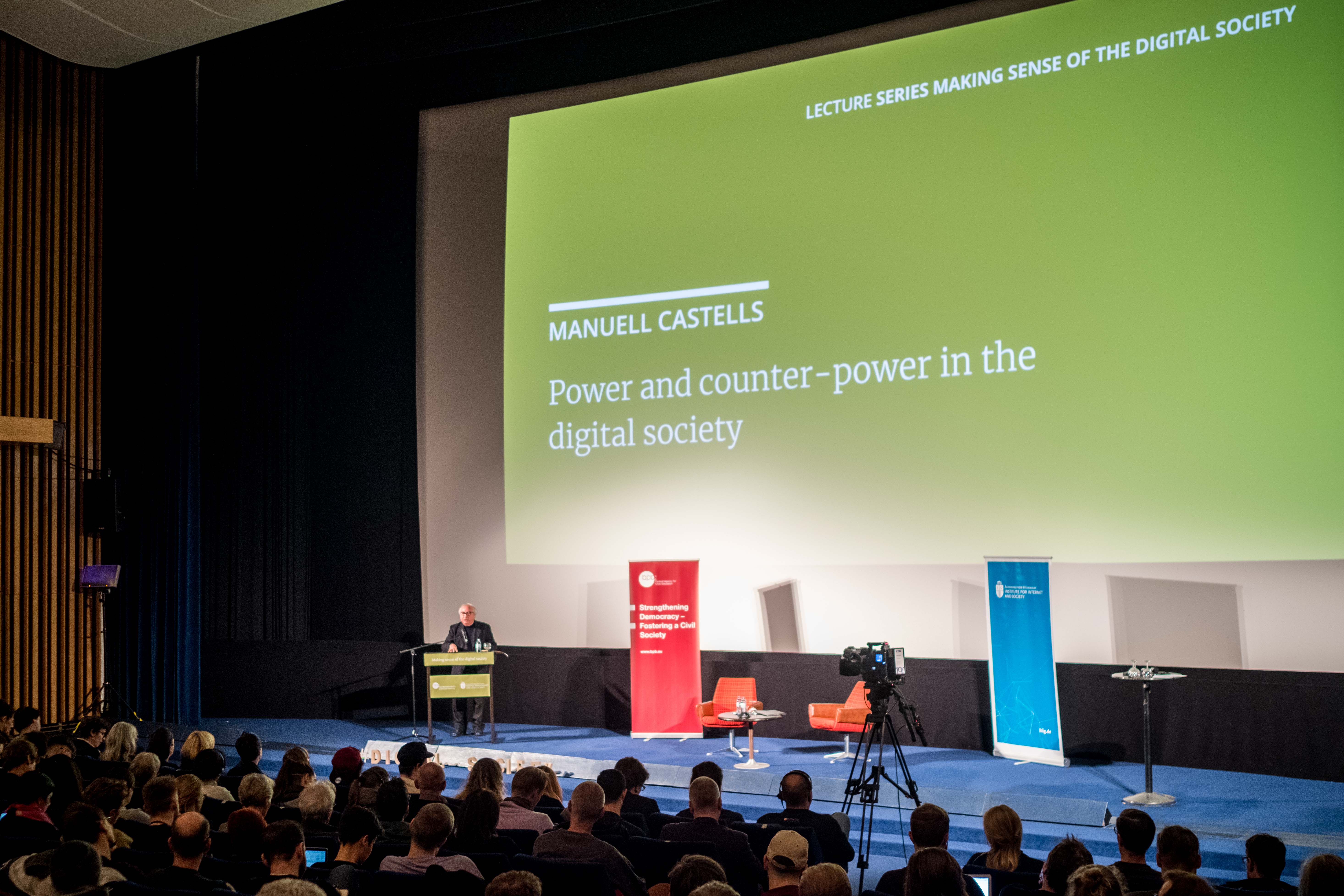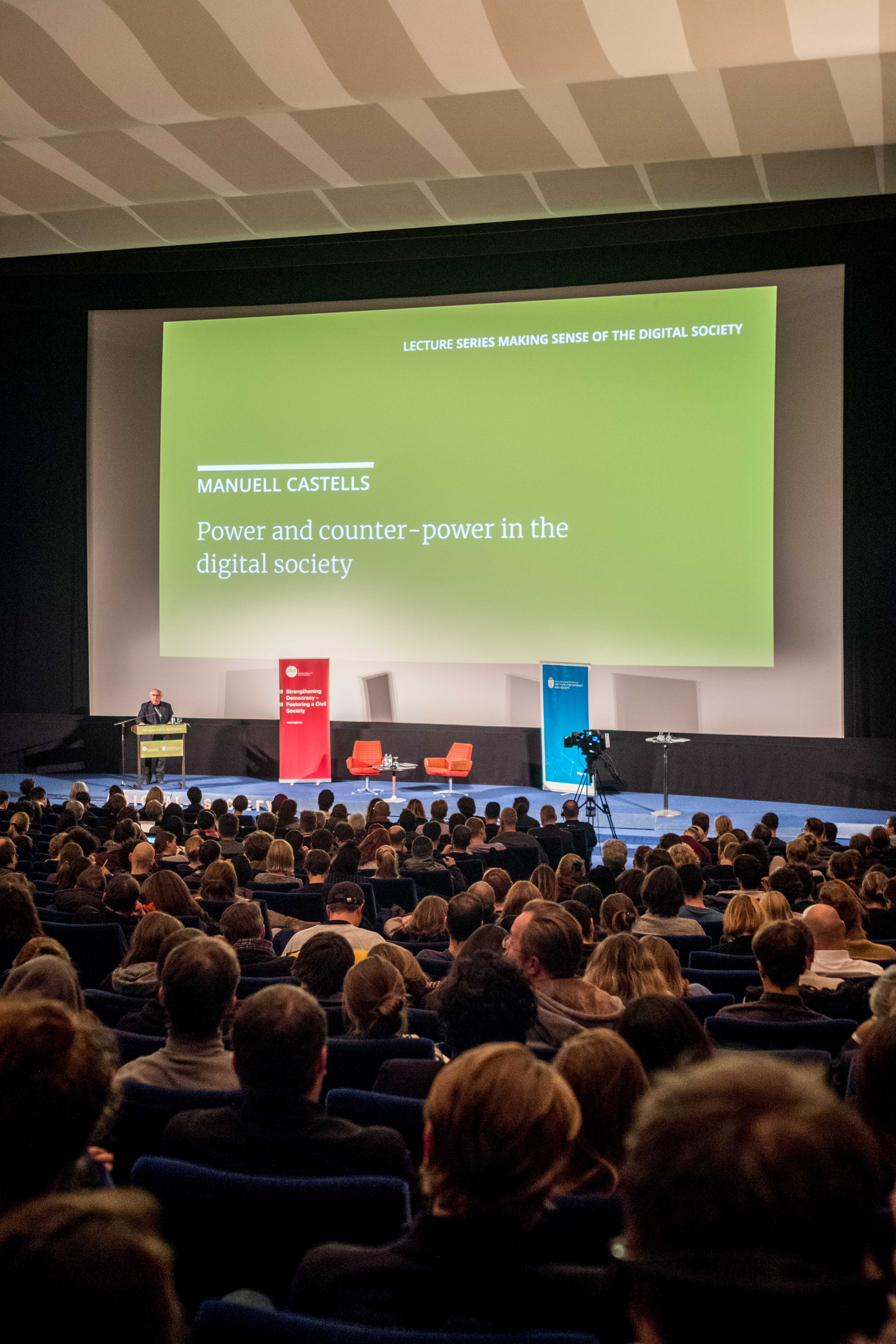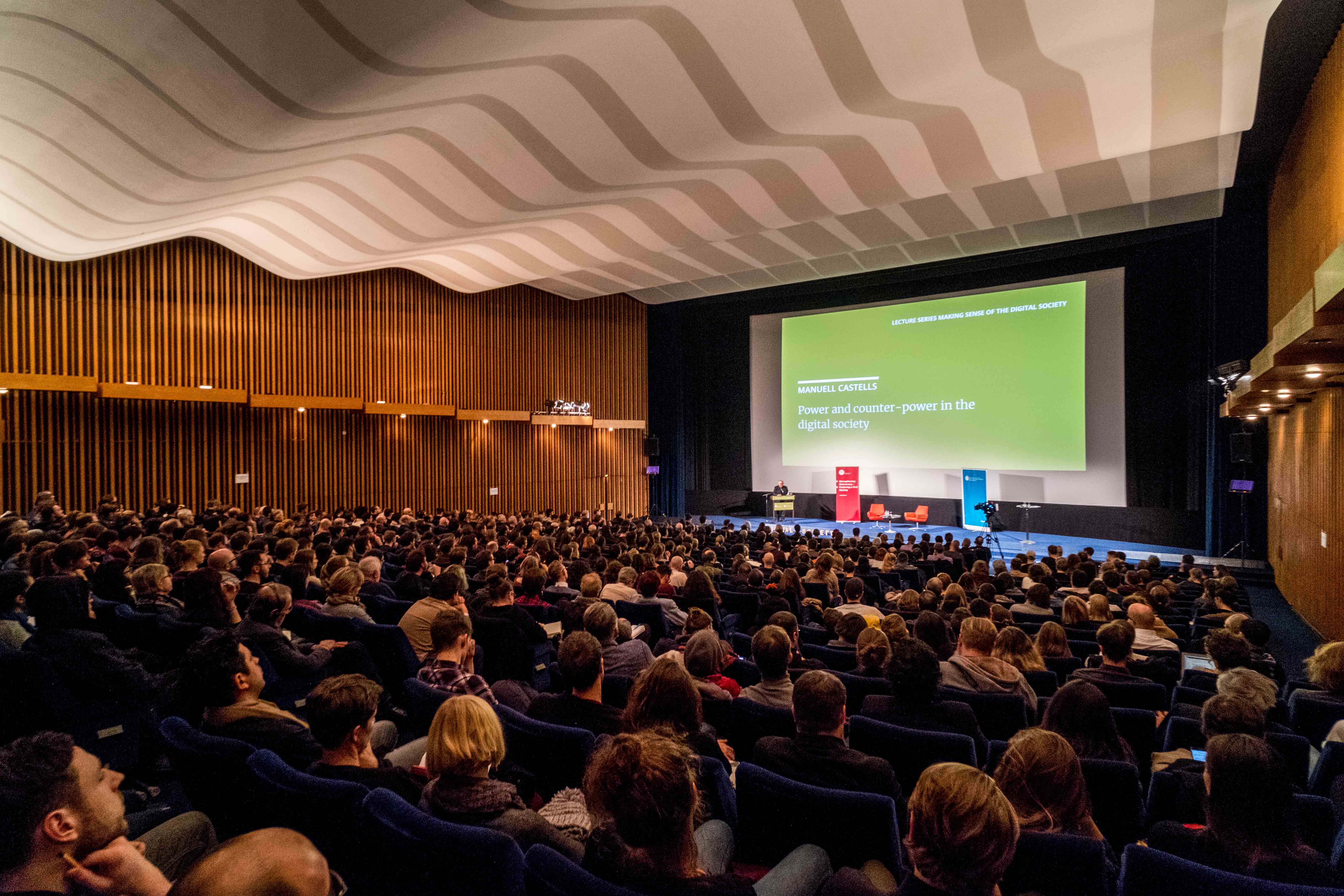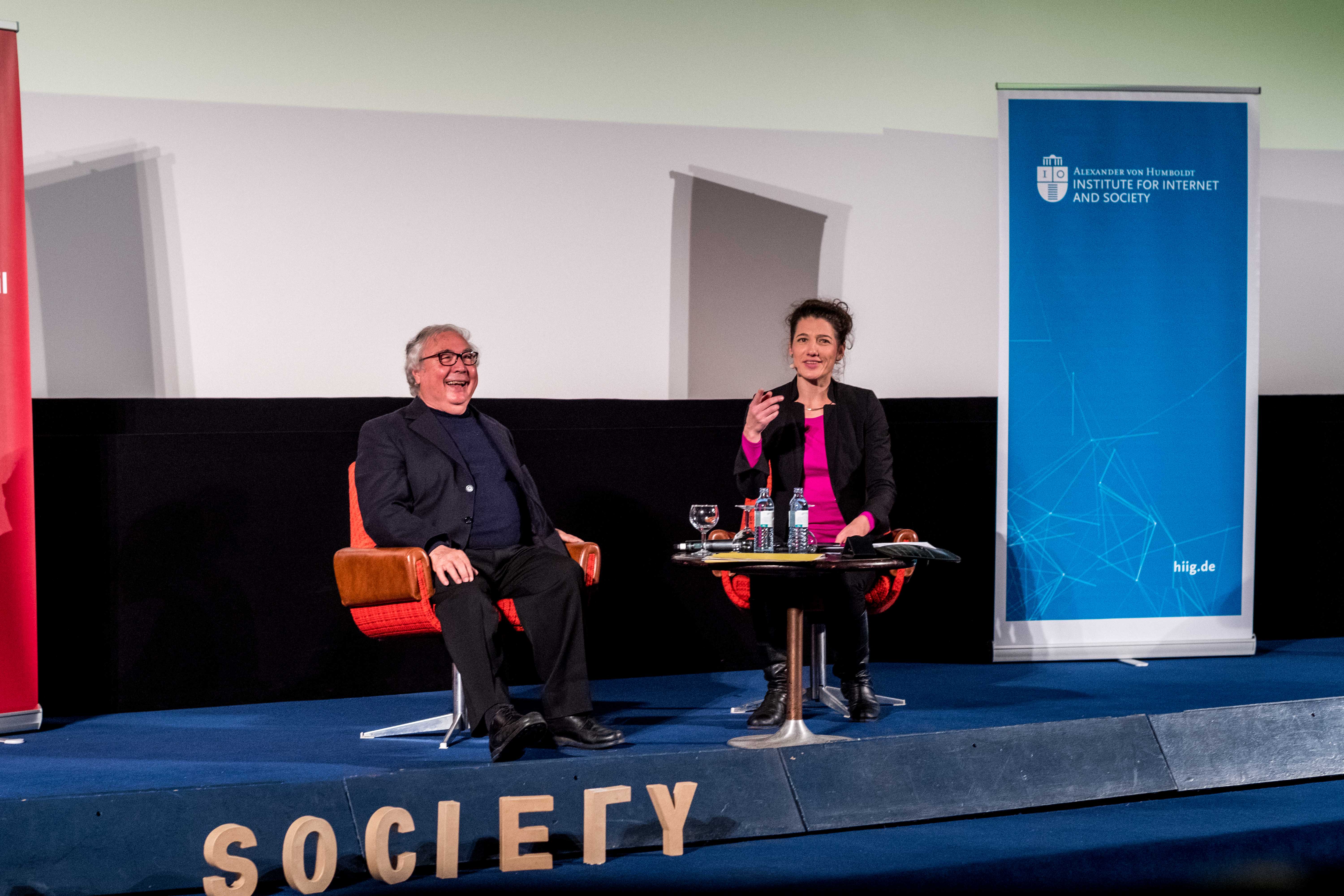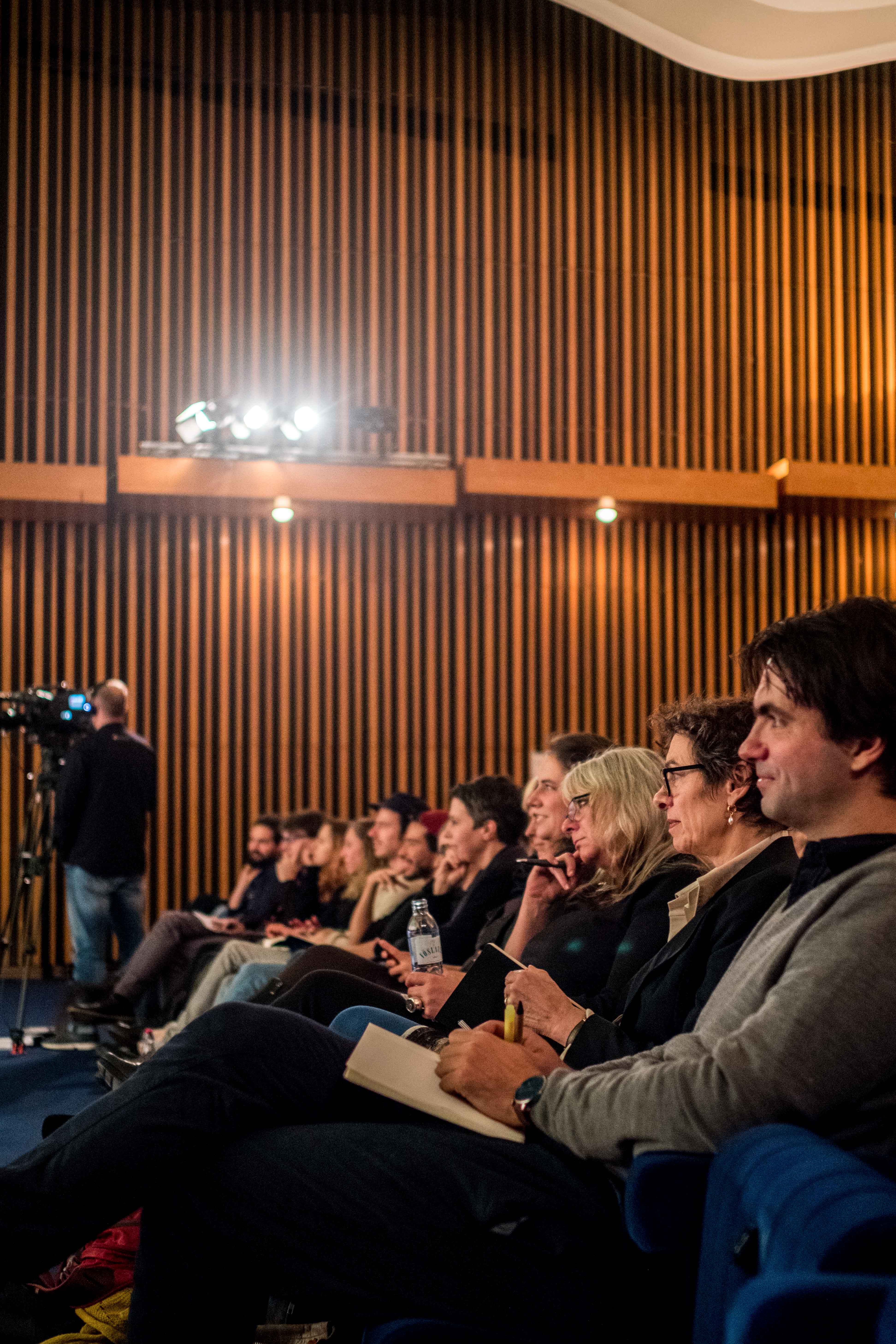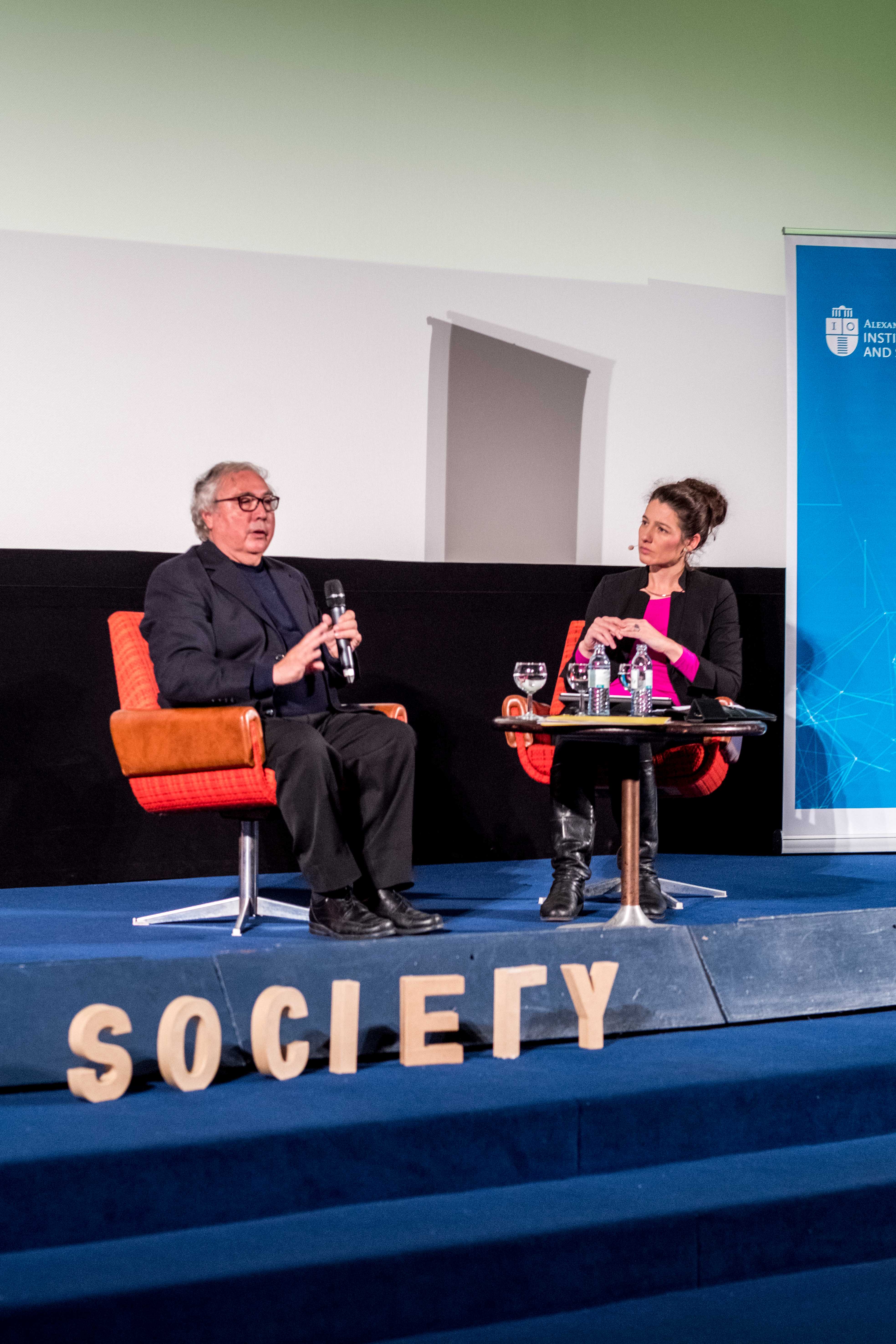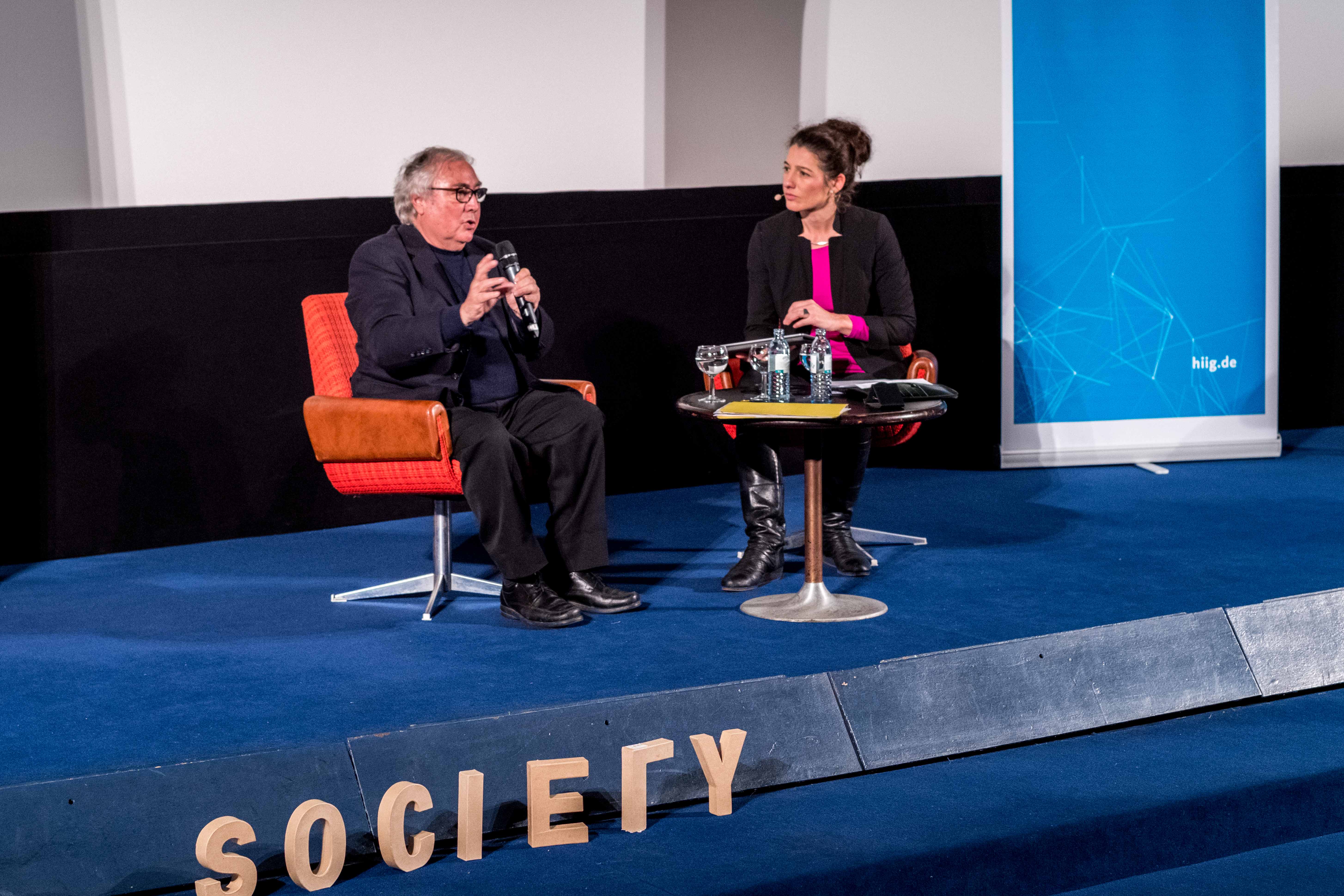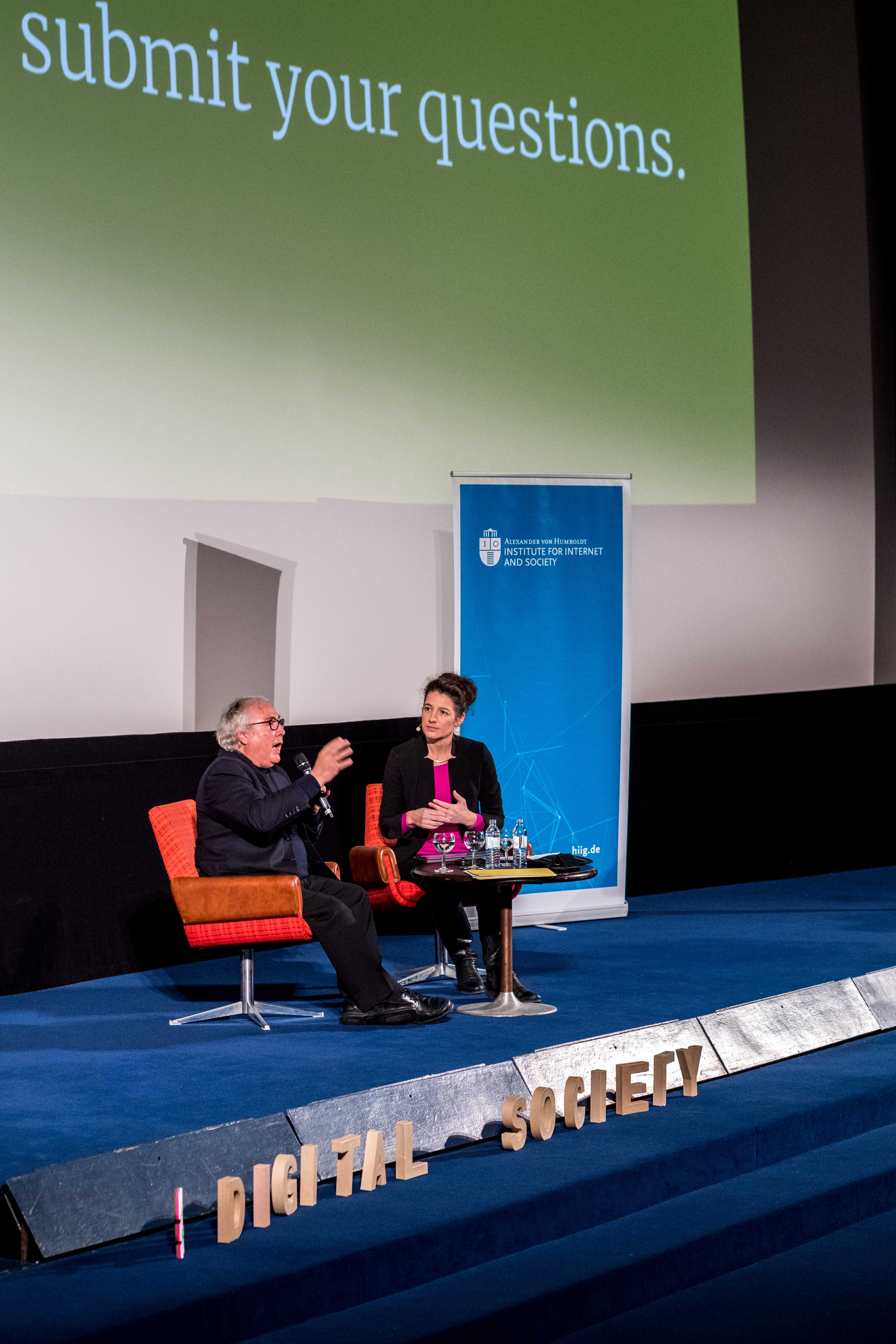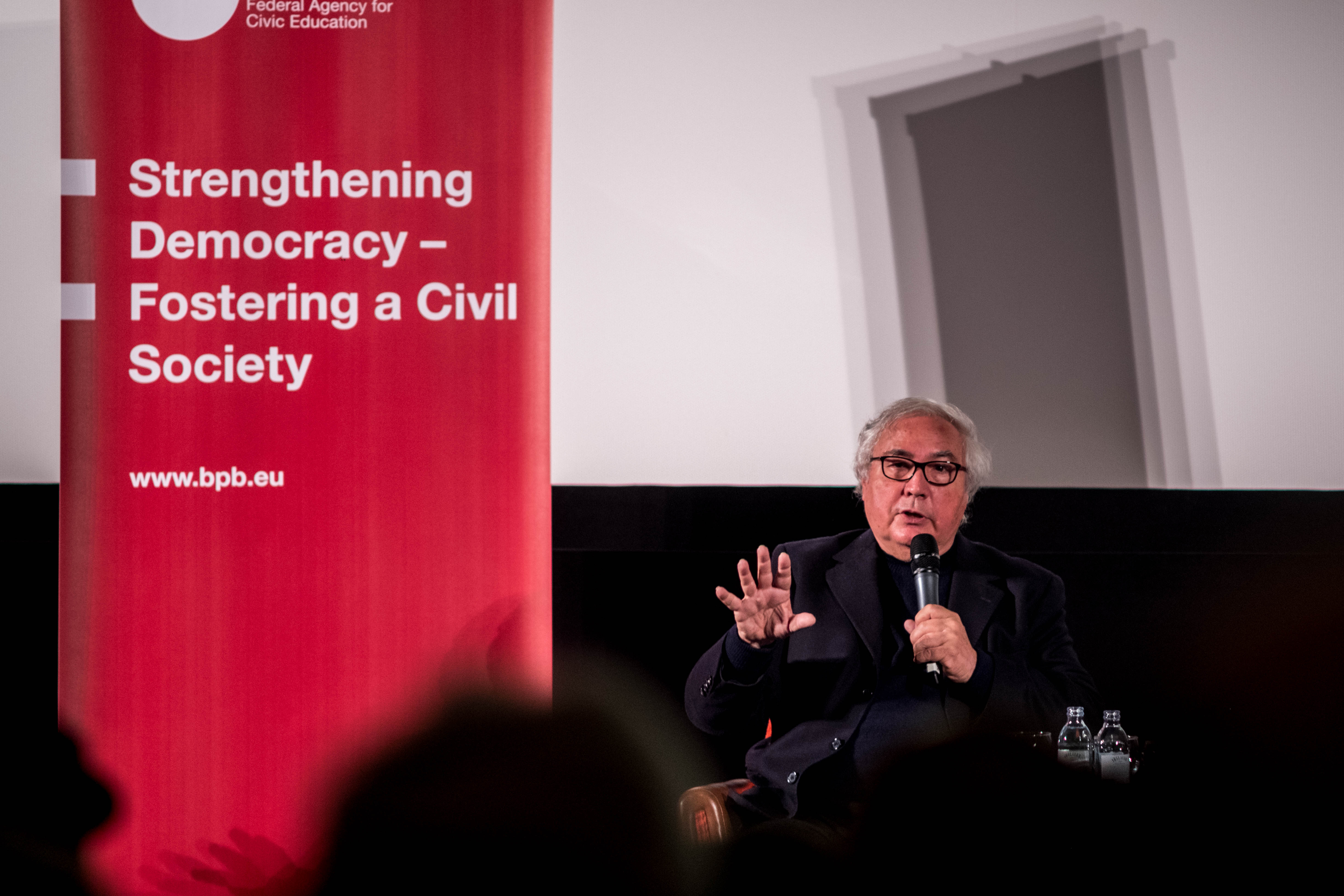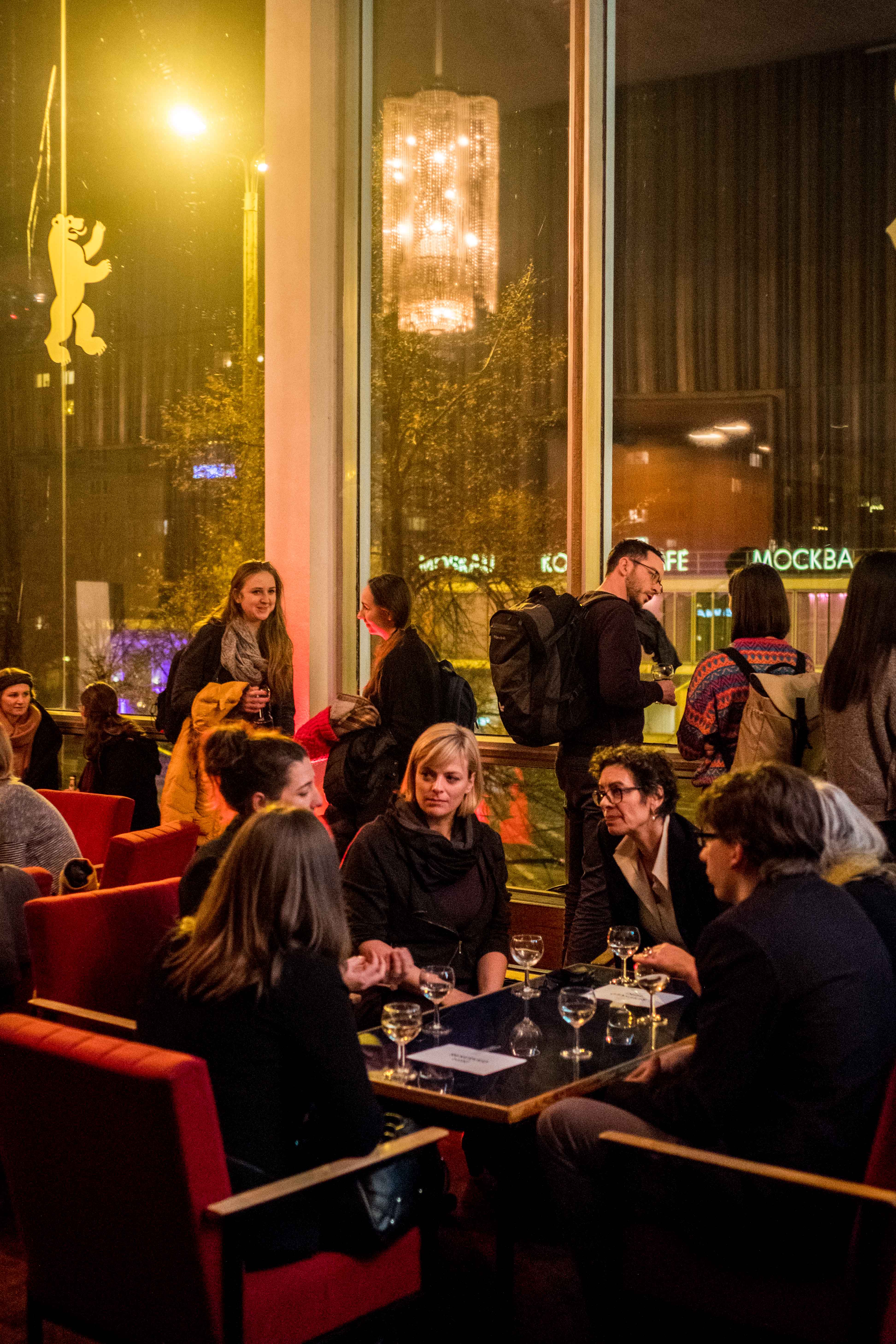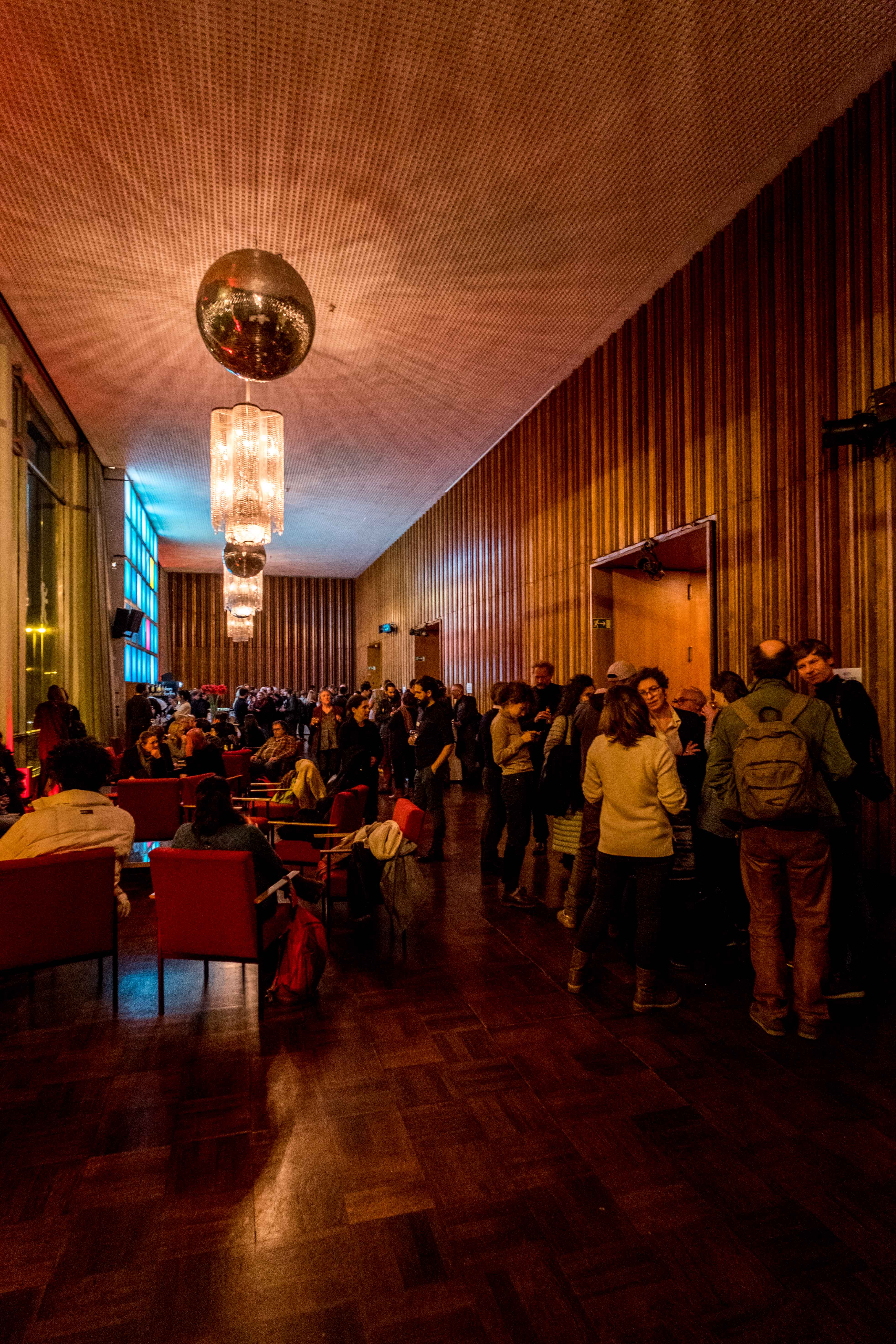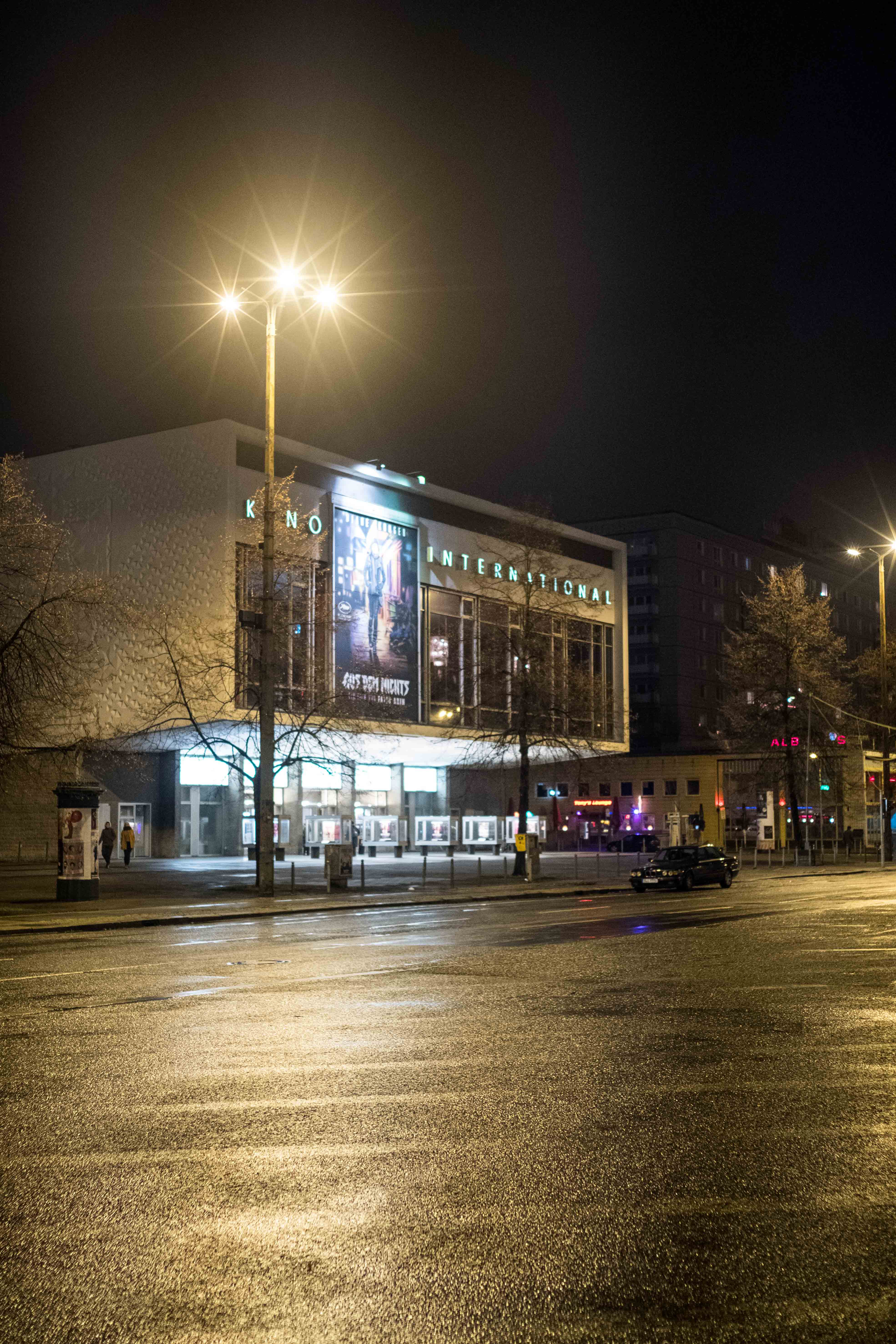Making sense of our connected world

Power and counter-power in the digital society
How is power constituted in the digital society? Who is powerful – and how can power be countered and contested? On 12 December 2017, Manuel Castells held the opening lecture of our lecture series ‘Making Sense of Digital Society’, organised in cooperation with the German Federal Agency for Civic Education (bpb). Prior to his lecture Jeanette Hofmann, Director of the HIIG and Professor of Internet Politics at the Freie Universität Berlin, met Professor Castells for an interview to discuss his work.
Jeanette Hofmann: You are one of the academics who create their own terminology. You use lots of metaphors, some come from software and hardware development, others like “space of flows” are something entirely different. What are the sources of the language you use to describe society and its changes?
Manuel Castells: I would characterise my work as grounded theory. First I search for reliable information and depending on what I find, I then try to look for concepts that fit reality. My concept of the network society that I proposed in 1996 came from investigating all the different dimensions of interaction between digital network technologies and social processes. At the heart of every domain I analysed, it was clearly networks as the most important element in the configuration of a new social structure. Although networks have always existed, they could not scale up beyond a certain size, volume and intensity in former times. The new network technologies did not determine anything, but they enabled networks to expand without losing the capacity to focus on specific projects. This way they centralised decision-making and at the same time decentralized the execution. Regarding these changes, network was the obvious term to use.
I use terminology from computer science only when it actually fits what I’m trying to understand. For instance when I talk about the programmers and the switchers. In my empirical analysis on the formation of power, I observed that power is always related to the capacity to give instructions to our lives through the automated networks that organise business, social processes, and so on. This automated capacity to make decisions is what I call a program. The same counts for the switchers. Switching as a key element in power making is the capacity to connect networks of power, for instance, in the media, politics, financial markets, or scientific networks. So because the capacity to network is a switching function, the term fits quite well, instead of some very abstract word that might render the same kind of precision, but would be quite difficult to understand.
If you choose to coin your own terms, does it also come at a cost, because it doesn’t link as easily to other people’s work if you use your own terminology?
No, because I don’t link to other people’s work. I do my own work and I suspect that my work is useful and helps understand a lot of processes. I am really an empirical researcher, so I don’t start by looking at other theories, which I know and have read of course. I create my own conceptual system, because I create my own theory and I do not place myself in relationship to other theories. I do my work and if it is interesting for other people, they will take it, criticize it, and I will change it of course, but always in reference to my own theoretical construction, not to others.
Did you make the decision to use your own terminology and to build your own theory early in your career?
It was a reaction against some existing trends in the social sciences requiring you to read everything before you can say something. It is a statement that I do not necessarily need to refer to what other people have done. I do use some elements from other people and integrate it into my theory, but I do not place myself in the common terrain of a given field of research; I do research.
You discovered the significance of digital networks quite early, in the 1990s. Now, 20 years later, we see a lot of changes under the header of digitisation, both social and technological. How have the networks you studied changed in your own understanding?
First of all, the networks have expanded into every domain of activity and to every corner of the planet. So the logic of networks that was in embryonic form back then is now overwhelming every other logic. Secondly, microelectronic digital networks are being modified and transformed by the practices of their users. The fact that users are the producers is one of the key rules of the internet. In 1996, there were about 40 million users, now we have 4 billion users. Since the inputs of the users are modifying and transforming the networks, size is quality.
At the same time, technology has continued to evolve dramatically. Therefore, the speed and flexibility of the networks in every domain has multiplied. So the logic of networks itself, through constant, almost real-time feedback loops, has modified the logic of the networks. Virality is the key transformation of the internet. Now, the issue about this logic, where velocity, transmission and management of size and volume has been so fundamentally accrued, is that networks are modified through inputs that have unattended effects and create other unattended effects. Therefore, networks experience exponential growth where irreversibility and uncertainty increases.
Can you give me an example for an unintended effect that really has an impact on the networks you are describing?
Financial markets! No one was really thinking that financial markets could evolve by themselves, away from human decision-making. It is not that computers make the decisions by themselves, which was prohibited in 1987. The complexity of the derivatives, the synthetic securities, is so enormous that no one can control it, no regulators and none of the financial agents. They hope it will evolve in one particular direction, but it is impossible to actually control it. There was no deliberate action to have a financial market independent of everything.
The lack of control and understanding is currently very present when we talk about machine learning. So I’m wondering whether there is a new quality emerging where we are facing more and more phenomena clearly outside of our control. Would you say that this is something new?
Absolutely. If you look at what is happening now with the Internet of Things, you can see that networks are now multiplying in a way in which we not only connect networks enacted by humans, but also networks enacted by machines between different machines. At the origin there is some programming by humans. But what is out of control is that these machines are subsequently programming and reprogramming each other and they are literally making decisions.
They make formatting decisions, or programming decisions, as you put it.
Yes, they make programming decisions. They do have some rules, to make things more efficient, broader and cheaper. I was always critical of trying to understand the transformation of technologies and our technological environment through science fiction, because it would put social scientists out of their jobs for the benefit of science fiction writers. However, science fiction writers have seen intuitively many of the developments that later on have actually happened, because they are not constrained by data and instead use their imagination. This way, they have actually foreseen some things like machines programming machines. For networks, this means that the interaction is still one between agents, but some of the agents are machines. This is changing everything. We are at the beginning of that, but this development is going on at an incredible speed.
So, do you think we are becoming the victims of our own success?
I don’t think that success is the right word for the development of technology. Any technology that humanity has developed is ultimately used, like nuclear bombs. So success is relative. We are enhancing our power while not developing to the same extent the ethical, social, and political responsibility to manage that power.
Lecture series: Making sense of the digital society
Let me rephrase that question. If all technology is about extending control…
No, it is about extending power. The ability to do more and more things. In my empirical analysis, I find that the more you extend power, the more you lose control.
Yes, that is perhaps the point. I would say the intention is very often to extend control. Look at something like predictive analytics. It is the attempt to control future things that are going to happen, but the effect of trying to extend control is creating uncontrollable situations. That’s probably the paradox we are observing at the moment.
Absolutely.
Originally you defined microelectronics, a capitalism that was restructuring itself, and cultural movements as the driving forces of networks. Do you see a shift in the relative contribution or dominance of these factors? Are we still dealing with the same factors, technology, economy, and political-cultural movements?
They are still the same. The only thing that I would add, which is really important, is that these social movements as political actors based on identities are also networked. I was defining the domain of networks as the domain of instrumentality, for instance, regarding global business, financial markets, and the media. And then there was the cultural identity as resistance, as localities that resist being taken into the flows of networks. Religious identity movements have become a major challenge to the instrumental logic of the networks. Talking about Islamic fundamentalism, but also about others, they are globally networked and use network technologies very efficiently. Therefore, the logic of networks has penetrated the logic of cultural identity.
In your early work, you defined identity as an important resource for opposition. At the same time you noticed how ambivalent these opposition movements are, because they can be progressive, but also very oppressive. So what do you make of the fact that the oppressive identity-based movements seem to be more powerful than others at the moments?
Yes, this is a critical element in my analysis. First of all, all movements, not only identity-based ones, can be progressive, reactionary, oppressive, or liberating. I show that the logic of identity, which is human and serves to construct meaning, evolves. Take, for example, the most important identity practice, which is religion, and fundamentalism as their derivation. If we look at what has happened in political and geopolitical terms in the past 15 years, I would say the logic of identity building and constructing everything around the meaning of identity has been more important in shaping politics, people’s lives and society than the logic of networks and technological innovation. Today we live in a world dominated by fear, fear of the other. And this fear of the other starts by the definition of us and the other, which is the essence of identity. Technologies are now used to strengthen this opposition. I tried to say this from the very beginning. There are new networks of instrumentality, in a new society emerging, where everything is more productive, efficient, et cetera. But at the same time, the segments of the population that do not recognise themselves in that logic, whose values are excluded from it, and who had no power, turned things around and built new identity-based conflicts. This is now the most powerful tool to shape our societies.
© Photos: Mathias Völzke/HIIG
Do you still see progressive potential in identity-based movements?
Sometimes these identity-based movements produce states and regimes, which in the traditional terms of being able to affirm human dignity are progressive and positive. For instance in Bolivia, Indian cultures that were never acknowledged, and in particular an Indian women’s culture called cholitas, were empowered all over the country. There is now a multicultural state. So the affirmation of identity in some cases has had a positive, deliberating effect on some people, often the most oppressed.
And the most extraordinary transformation in the last thirty years, which I also point out in my work, is the transformation of women’s consciousness. The minds of women have changed in many countries, not only in the Western ones. This is a fundamental transformation, which is not about technology, but about identity. The contradiction with technology is that women do not just want to automate the tasks they have been doing in the domestic world in order to do them more efficiently. They want to change the rules of living as couples. So in that sense, the cultural transformation is not produced by the technological transformation. It is deeper and more important than the technological transformation itself.
And at times it assumes a networked organisation, but not always and everywhere, wouldn’t you say so? The “#MeToo” movement is clearly a sign of a network.
Exactly. “#MeToo” is a network that is constructed with some dominant nodes. But I would not say that in Ecuador or Mexico, for instance, this network against abuse of women, sexual harassment, and rape is not important. The network is less generalized in these places, because the institutional obstacles and historical traditions make it more difficult to expand at the same speed. But the networks are still being formed and everything that happens today in Germany, the United States, or Barcelona connects and expands to many other networks. “#MeToo” is a fundamental case of transformation. They have turned the world of Hollywood upside down, the world of finance, the world of the media, it has entered politics, and all of that just in a few weeks.
Would you agree that part of the development we see is that the logic of networks as such is contested? Networks have sort of dissipated and integrated everything by now, but that makes the logic of networks more contested than before.
Originally that was my analysis, but my empirical analysis showed me something else. My opposition between the net and the self was about that. The self is me in my locale, my religion, et cetera. But as soon as this resistance in terms of identity realised that it could only fight on the basis of global connections, they adopted the logic of networks as an offensive logic, and not simply as a defensive territorial logic. At first I assumed that the concepts of “space of flows” and “space of places” oppose each other. But then I observed that these places are connecting and fighting the logic of dominant flows through other flows and networks. That is what I called “grassrooting the space of flows”. What I was originally thinking was too static. In practice, I could see the construction of alternative networks based on identity and alternative values.
So, it would rather be on what you call programming networks where the contestation takes place.
Absolutely, in my book “Communication Power”, I call this reprogramming. Power is exercised through programming networks and counter-power is exercised by reprogramming them. If we look at history, this is exactly what has always happened. The large factories in the industrial age were a way of organising the exploitation of the working class. The working class organised itself against exploitation on the basis of the factories, by creating unions in the factories. The socialisation of exploitation led to the socialisation of a struggle. So you don’t fight networks with places, you fight networks with networks.
What is the relationship between technology and manipulation?
The more you have technologically enhanced power, the more you have the possibility to manipulate information. That is what is happening, for instance, with the bots in the social networks.
But this only works for a short time. As soon as everyone knows about bots, they lose their impact. People learn, and this includes our ability to recognise and resist these kinds of manipulation.
Exactly. It is not a linear process. It is a contradictory process between what happens in the continuation of a logic and our capacity to counter the logic consciously. Ultimately, human consciousness prevails.
Manuel Castells is Professor of Sociology at the Open University of Catalonia as well as University Professor of Communication Technology and Society at the University of Southern California. His Information Age trilogy (1996–2003) is widely recognised as one of the most important and most cited works of social theory in the context of digitisation. A shorter version of this interview was published in the 2017 volume of encore.
This post represents the view of the author and does not necessarily represent the view of the institute itself. For more information about the topics of these articles and associated research projects, please contact info@hiig.de.

You will receive our latest blog articles once a month in a newsletter.
Platform governance
The Human in the Loop in automated credit lending – Human expertise for greater fairness
How fair is automated credit lending? Where is human expertise essential?
Impactful by design: For digital entrepreneurs driven to create positive societal impact
How impact entrepreneurs can shape digital innovation to build technologies that create meaningful and lasting societal change.
Identifying bias, taking responsibility: Critical perspectives on AI and data quality in higher education
AI is changing higher education. This article explores the risks of bias and why we need a critical approach.
